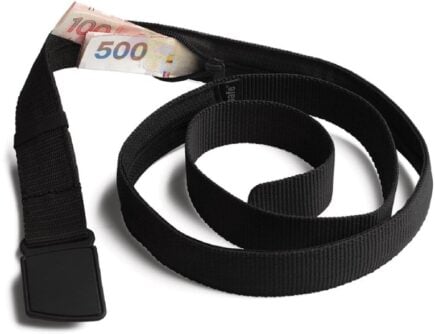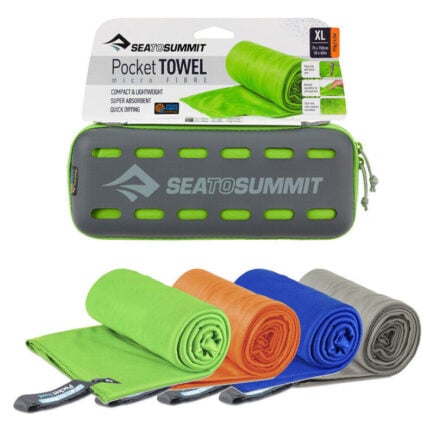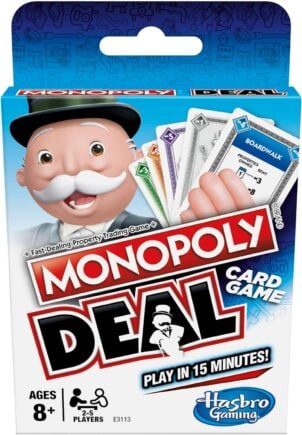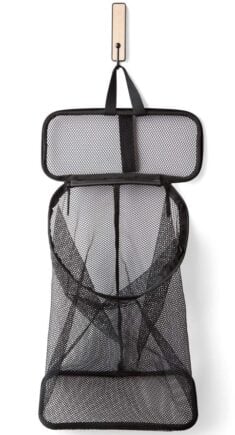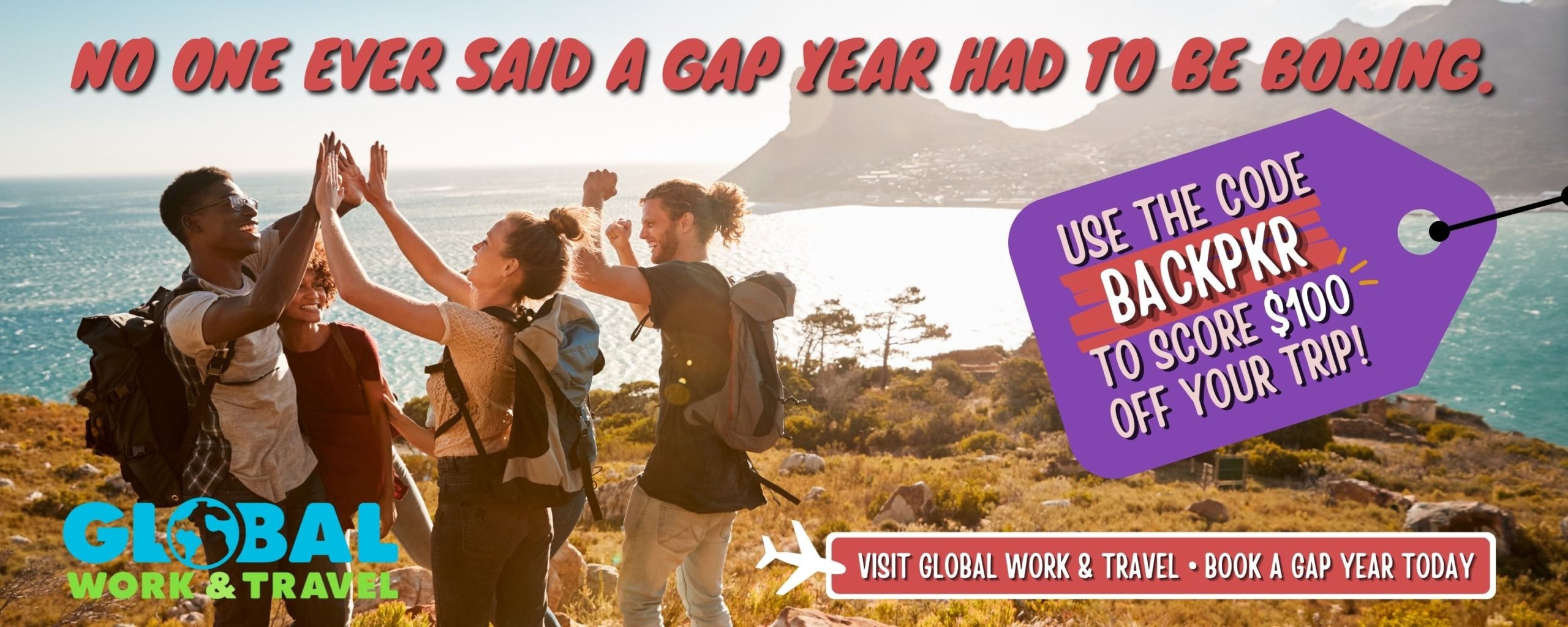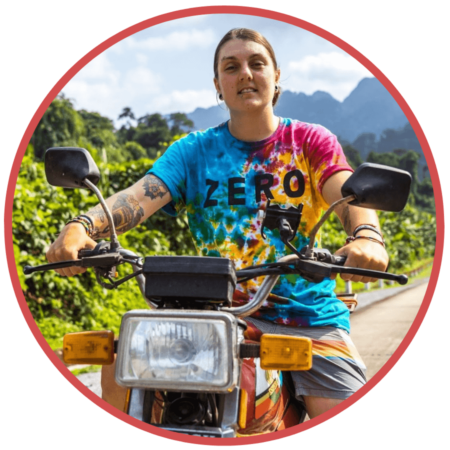The Broke Backpacker is supported by you. Clicking through our links may earn us a small affiliate commission, and that's what allows us to keep producing free content 🙂 Learn more.
Ernest Hemingway was onto something when he called Paris a “Moveable Feast“. I am going to take it one step further and say backpacking France is the ultimate moveable feast. Be it because France is home to some of the most delicious cuisines on the planet, or because it is the most landscape diverse country in Western Europe.
Backpacking France will take you on a journey through the many layers of history, culture, and natural beauty this amazing country has to offer. From legendary castles, epic hiking trails, and world-class food, beaches, and mountains, backpacking France is the ultimate European backpacking destination…
Nowhere else in Europe can you jump between radically different coasts, high mountains, exciting cities, and an unbelievable array of culinary traditions within the borders of one medium-sized country. Think traveling in Europe is too expensive for backpackers? This budget backpacking guide offers you the best routes, itineraries, and things to do so you can make the most of your time in France without breaking the bank.
France is full of hidden treasures that the average traveler may never learn about. I aim to show you the way to experiencing these truly special places in a way that is unique and personally rewarding. Backpacking France is one hell of a good time. It is no wonder I ended up living here! Let’s take a look at what budget backpacking in France is all about…
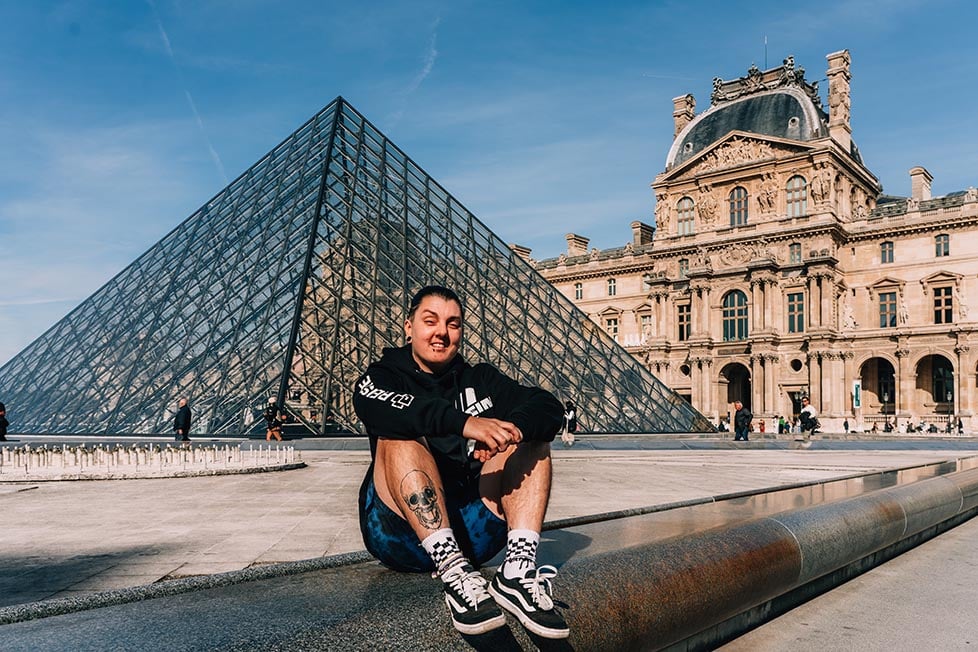
Photo: Nic Hilditch-Short
The Broke Backpacker is supported by you. Clicking through our links may earn us a small affiliate commission, and that's what allows us to keep producing free content 🙂 Learn more.
Why Go Backpacking in France
Backpacking France can truly feel like you are visiting multiple countries tucked inside one. The country is incredibly diverse and each region has its own magic. France is fiercely proud of its history and numerous traditions. Within that general national French pride regarding all things French, are regional specialities. Be it language, music, food, architecture, cheese, bread, industry; you name it. There is literally a different kind of cheese and wine to try for every day of the year.
Whilst backpacking France, the opportunities of what to do and where to explore are unending. Even if you are short on time I have good news for you. France is a well-connected country with fast, reliable public transportation. Whatever your timeframe is, backpacking France is an experience you will never forget.
Trek in the Alps. Sip a cold drink on the Mediterranean beaches. Visit the museums in Paris. Bike around Provence tasting wine. Backpacking France is an experience that truly pleases all of your senses.
You do not have to look too far to see why France has been inspiring artists, philosophers, and writers for centuries. France lives up to its hype as a world-class destination and in fact, some of the best parts of France lie off the beaten track. Backpacking France will take you on a journey through the heart of it all.
The country can be pricy so we suggest you cut costs by making your own food, many French hostels have good kitchen facilities and Lidl supermarkets are plentiful.
Best Travel Itineraries for Backpacking France
Looking for a France backpacking route? Whether you have a few weeks or a few months, I have assembled four backpacking France itineraries to help you make the most of your time in this ultra-diverse country. The backpacking routes can easily be combined or customized!
Backpacking France 7 day Itinerary # 1: Paris and the Loire Valley
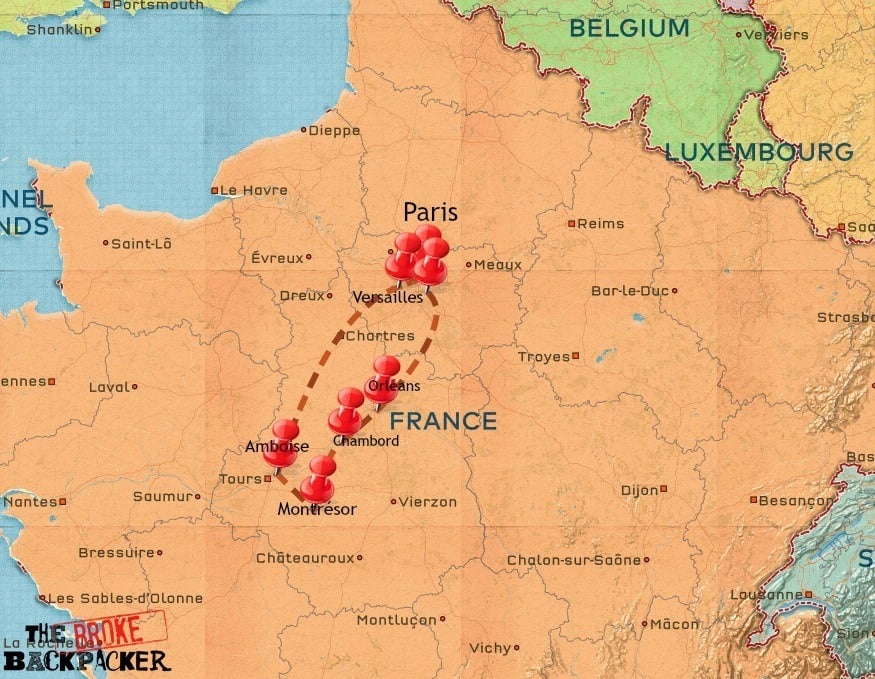
Perhaps no other city in the world receives as much attention on an annual basis then Paris. The City of Light has been the center of major revolutions, great architectural achievements, and Enlightenment philosophy. Countless artists, writers, thinkers, and romantics have flocked to Paris over the centuries all in search of a piece of that Parisian Magic.
I have plenty of travel tips for Paris, but my number one would be to mix it up between the “sights” and exploring more off the beaten track areas.
A few hours south of Paris lies the Loire Valley. This 170 mile stretch of central France has some of the most jaw-dropping scenery in the whole country. Beautiful sprawling castle estates, wineries, and miles of flat scenic highway make the Loire Valley a travelers paradise.
As one of the most iconic and beautiful places in all of France, the Loire Valley sees a ton of human traffic. In my opinion, the valley is best explored by camper van or bicycle. Public transportation or hitchhiking are great alternatives to cycling, though not quite as rewarding. The only way to escape the crowds in the Loire Valley is to have your own transport and timeframe. Having a bicycle is a great way to see the sites but at your own pace. If you dig castles, history, and fairytale landscapes, a bike tour of the Loire Valley is perfect for you.
Backpacking France 2 week Itinerary #2: Provence and The South
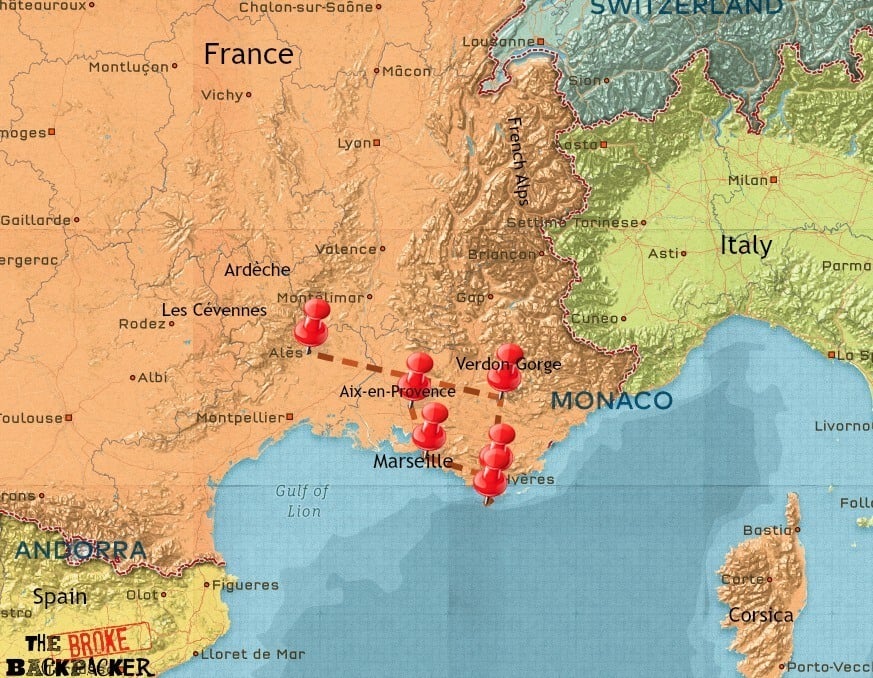
Rolling Lavender fields, olive groves, and landscapes straight out of Vincent Van Gogh’s dreams? You must be in Provence. The south of France is a world away from Paris and the north. Welcome to the land of the sun! Explore the beautiful beaches and stunning interior of France’s most relaxed region.
If you make your way to Nice, check out our top hostel recommendations.
Backpacking France 2 week Itinerary #3: The French Alps
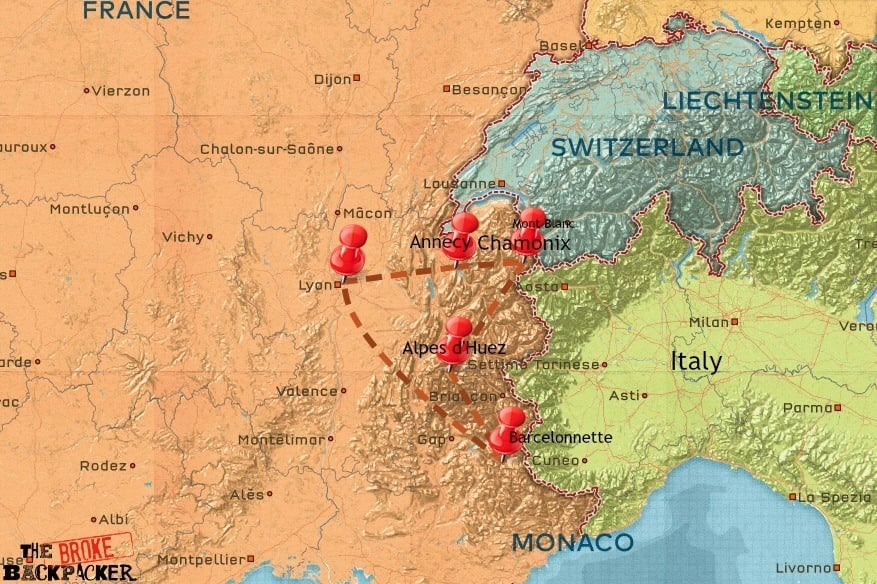
The Alps region in France is home to some of the most breathtaking natural scenery in Europe. The Alps are adventure central in France. The town of Chamonix is the birthplace of modern mountaineering and home to Mount Blanc, Europe’s tallest mountain. Whether you love to ski or love to trek, the French Alps are bound to be a highlight of your backpacking France adventure.
Backpacking France 10 day Itinerary #4: The Pyrenees
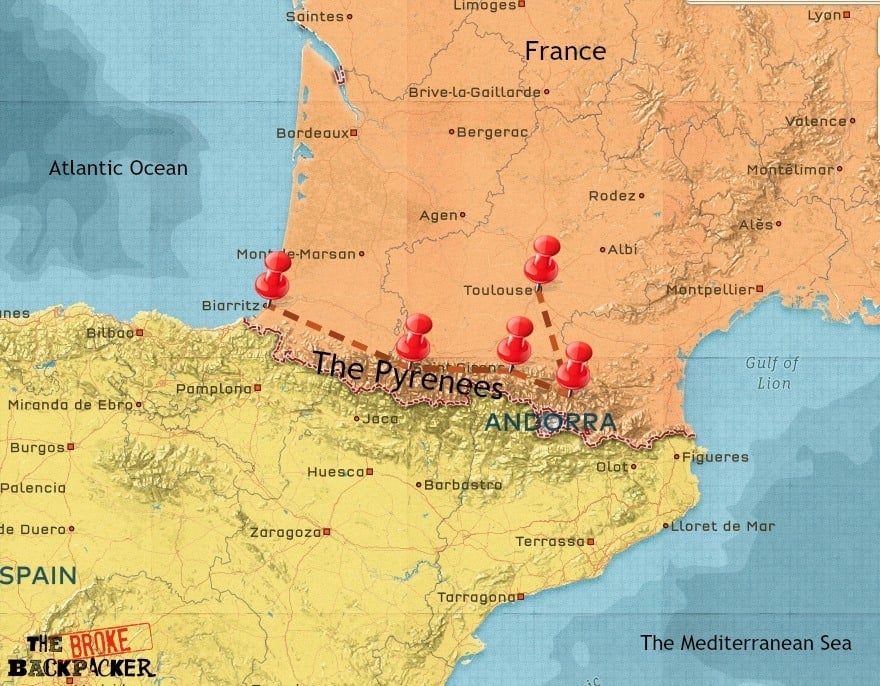
Ready for even more mountains to explore? The Pyrenees mountains are the natural border between France and Spain. There are countless tiny villages, well-connected hiking trails, and even a few big cities at the base of the mountains. The Pyrenees mountain chain encompasses a huge swath of southwestern France. The whole region stretches from the Mediterranean coast to the Atlantic coast.
The Pyrenees make up another very distinct character and flavor of France. There are plenty of opportunities to get off of the beaten path here and truly explore. While the Pyrenees might not have all of the tall peaks of the Alps, they are very wild in places and in general free of ritz, glamor, and associated snobbery of the Alps.
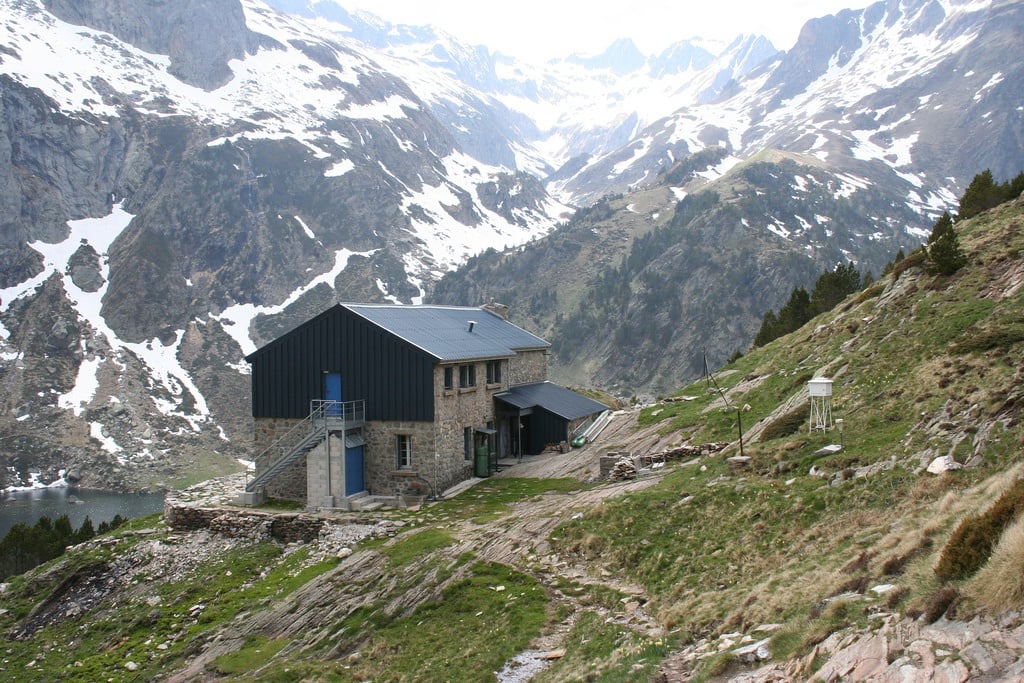
Backpacking in the Pyrenees is a whole trip onto itself. I recommend taking the time to visit some of the beautiful mountain towns like Lourdes, Foix, Saint-Jean-Pied-de-Port, Arreau, and Ayet en Bethmale.
You will find the people to be some of the most friendly folks in the whole country. Make sure you try some of the delicious cheeses in the region. In my opinion, some of the best cheese in France comes from the Pyrenees.
Join our entrepreneurship retreat in Bali!

Ahoy friends, Will here! Introducing a very special project that involves YOU – An 8-day immersive experience in Bali, where I have been living for 7 years now.
If you’re passionate about freedom and designing your dream life, this is your chance to join like-minded folk on the same path and learn from my own wins, losses and lessons over my fifteen years of entrepreneurship, whilst soaking in the best of beautiful Bali.
Expect daily workshops, recharge practices, intention setting and fire ceremonies and perhaps a cheeky game of pool against myself, the one and only undefeated pool legend. All while experiencing the island’s best-kept secrets ?
Places to Visit in France
Backpacking Paris
For obvious reasons, no journey backpacking France would be complete without a visit to Paris. One could easily spend weeks exploring the museums alone. Paris really has so much going on that it can be a bit overwhelming. If you only have a couple of days to visit Paris, I recommend sticking to what you like to do. Are you a foodie? Do you love art? Are you interested in history and architecture? Do you just want to drink wine and eat baguettes on the banks of the Seine?
Having said all this, I honestly recommend booking an Airbnb experience in Paris so you can see a more local side of the city and you might be surprised.
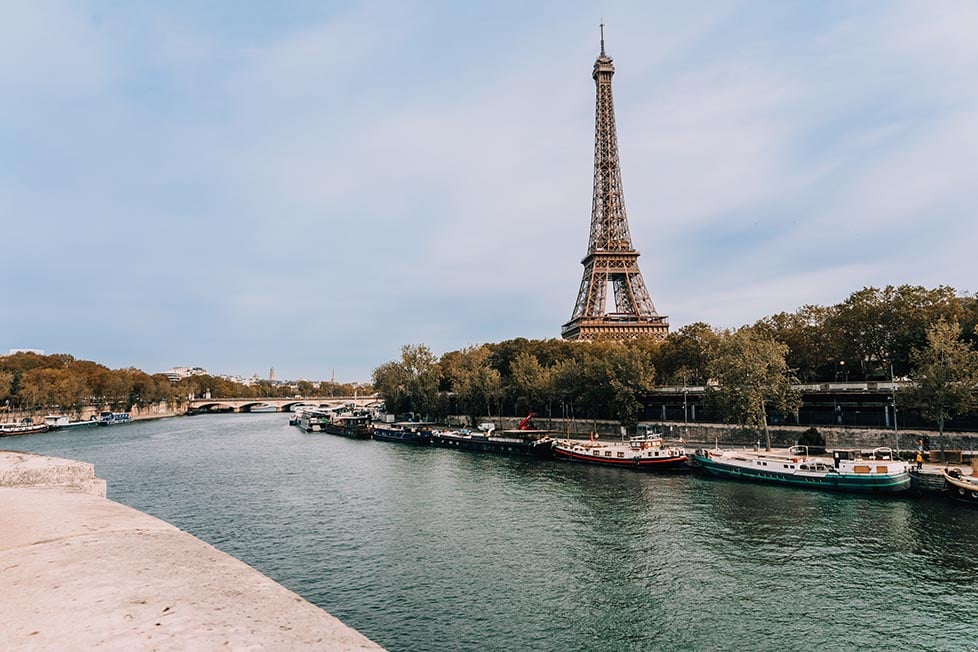
Photo: Nic Hilditch-Short
It is possible that you are interested in all of those things. Fact is, Paris is huge, and unless you have a couple months to spare, you simply won’t be able to see all of it in a few days. To get a feel for the essence of Paris, don’t exhaust yourself by trying to cram too much activity in. At the same time, have the fucking time of your life exploring this fantastic city.
Additional reading – Check out Paris’ best neighborhoods to stay in!
Paris in Two Days
Among one of the best museums in the world, The Louvre is an absolute must visit. If you head there after 6 pm on a Wednesday or Friday, entrance is reduced to just €6 and the museum is open until 9.45pm. Entrance is free for under 26s on Friday evenings. On Bastille Day (14 July) and the first Sunday of each month entrance is free for everyone. The Musée d’Orsay is another world-class art museum wroth checking out. The museum building is an old train station adjacent to the Seine.
Walk along the Seine River in route to one of the world’s most iconic structure: the Eiffel Tower. Cross the esplanade of Les Invalides and you’ll get to the Pont Alexander III, one of Paris’ most beautiful bridges. Once you arrive at the tower, you can choose to pay the hefty fee to ascend to the top or just enjoy it for free from the ground. The green lawn at the base of the Eiffel Tower is a great spot for a picnic.
The Montmartre neighborhood is a fun place to walk around, especially at night. Clichy Boulevard is a bohemian area with a fun nightlife and plenty of sketchy sex toy shops. Don’t drink too much if you want to have another successful day exploring Paris!
The next morning, you can begin your day with a trip to Notre Dame Cathedral. Like many places in Paris, the lines here can be fucking insane. I recommend for you to start early in order to avoid the mid-day crowds. Hike up to the top of the cathedral for killer views of Paris. After a quick (or slow lunch) at a cafe, head to Père Lachaise Cemetery. Normally I’d say cemeteries aren’t all that exciting, but some true legends are buried here including Jim Morrison, Edith Piaf, Oscar Wilde, and many many more.
Have You heard of the Paris Pass?
Feeling super motivated and full of energy? If you are looking to make a serious whirlwind tour of all the best things to do in Paris in just a few days, I recommend that you check out the Paris Pass.
The Paris Pass is basically an all-access pass to many of the most popular and important sites in Paris. If you really make use of it, the Paris Pass is definitely the cheapest way to see the top Paris attractions for a fraction of the cost of what you would pay for each one individually. Worth considering anyway.
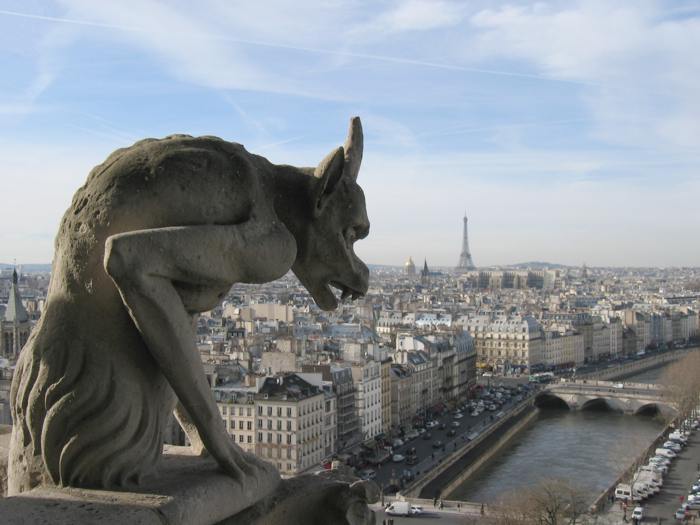
(Almost) Secret Paris
Want something fun to do in Paris that is off of the beaten track? There is a series of covered passages (Passages Couverts) located in the 2nd and 9th arrondissements where you can explore tiny hidden cafes, ancient bookshops, and delicious pâtisseries.
The passages were originally built in the 19th century, as a place where rich folks could still go shopping in bad weather. Now the passages are one of Paris’ lesser-known charms. Ok the secret might be out and these passages aren’t so secret, but they are certainly much more chill than the main landmarks of the city.
An afternoon stroll through this part of Paris is the perfect end to several days of heavy exploring. My three favorite passages: Panorama, Jouffroy, and Verdeau.
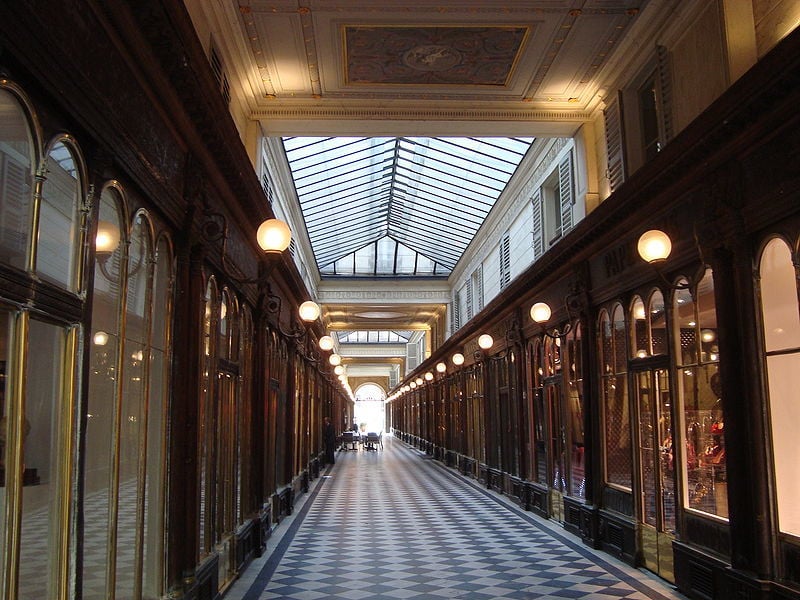
Best Urban Hike in Paris
The Coulée Verte is a elevated linear park built on top of obsolete railway infrastructure in the 12th arrondissement of Paris. This extensive green belt follows the old Vincennes railway line and makes for the best urban hike in Paris. The views are great and the path passes through plenty of pretty gardens and parks.
Beginning just east of the Opéra Bastille with the elevated Viaduc des Arts, it follows a 4.7 km (2.9 mi) path eastward that ends at a spiral staircase leading to the boulevard Périphérique beltway.
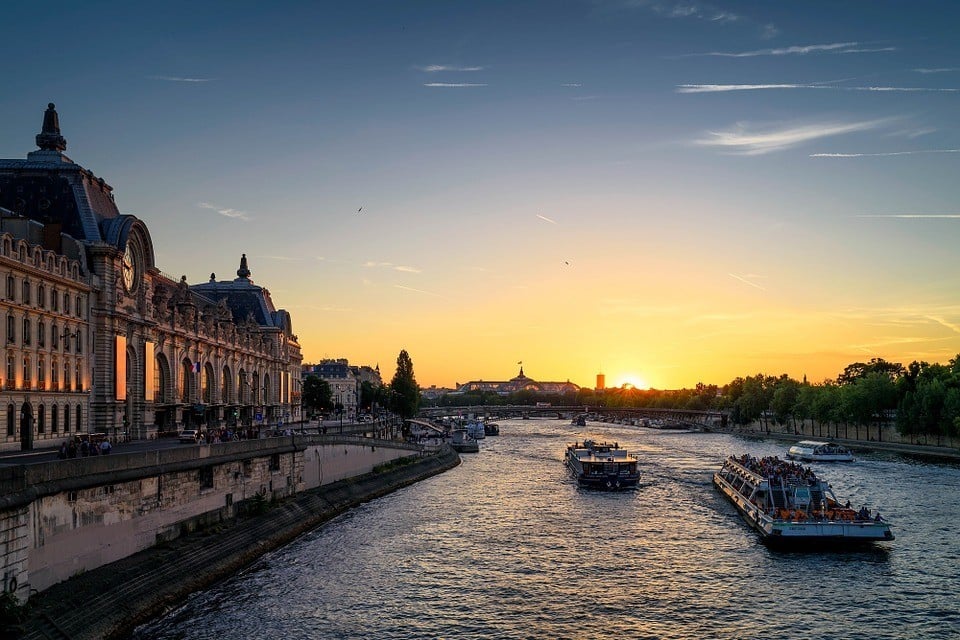
Eating out in Paris on a Budget
Paris has no shortage of fine places to eat. Whilst you might be tempted to go for some of the cheaper restaurants, there is something you should know. Many French people have told me that restaurants in some of the touristy areas of Paris have a little trick.
They think tourists are dumb or don’t know any better so the food they serve is anything but authentic French cuisine. You might pay 20 Euros for a bowl of Ratatouille that came from a can. Point is, know that you are aware of the canned food phenomenon, you can try to make an informed decision when choosing a place to eat.
This is not to say there are no good affordable places to eat in Paris. There are heaps of them! My advice is to simply avoid eating out in the obvious touristy spots.
Backpacking Versailles
The Palace of Versailles makes for a fantastic day trip from Paris. King Louis XIV did not fuck around when it came to building a fine palace for the royal family. The decadence of the place is pretty mind-blowing. The surrounding grounds and gardens are equally impressive as the palace.
Given the extreme wealth the Palace of Versailles symbolizes, it is not surprising to me in the least that the French Revolution started to take shape when King Louis XIV was a resident at Versailles.
Versailles and Paris are well-connected by train, so do pop over for a few hours and have a look for yourself. There is at least one “budget” hostel around too if you want to stay the night. You should probably just head back to Paris as accommodation in Versailles really isn’t worth the price.
Hungry for more information on Paris? Fear not! This city has so much to see and do that I wrote an entire Paris Backpacking Guide. Check it out!
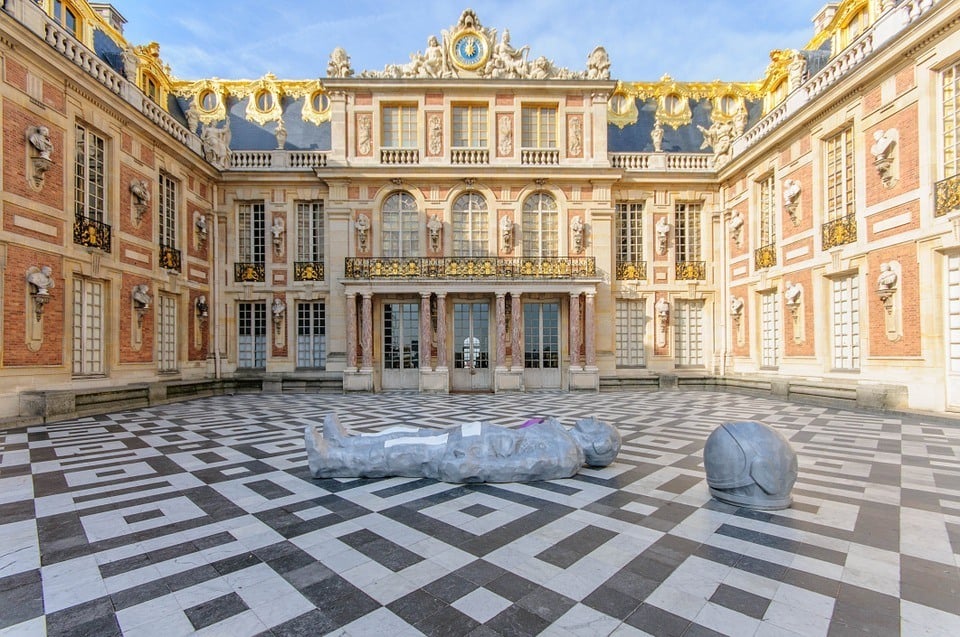
Backpacking Amboise
Amboise is a fine little town on the main Loire Valley circuit. It’s known for the Château d’Amboise, the grand 15th-century residence of King Charles VIII featuring Leonardo da Vinci’s tomb, as well as royal chambers, gardens and underground passageways.
The town of Amboise is brimming with romance. The best time to visit is in the spring when the flowers are exploding. If you are planning to do a bicycle tour of the region, Amboise makes for a great place to rest up in between riding days.
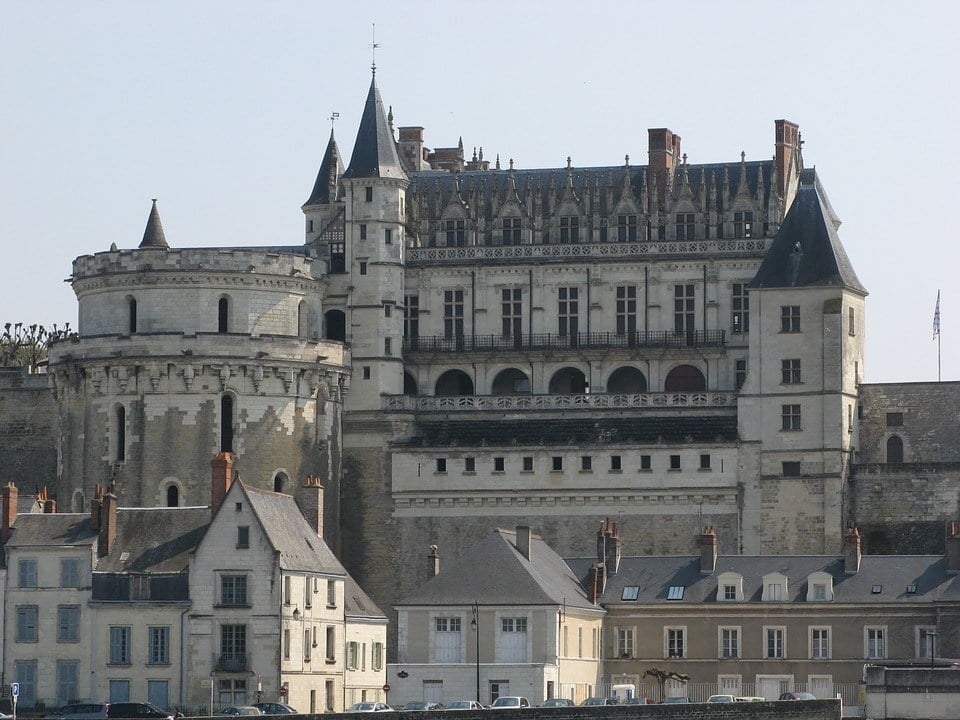
There is a fantastic weekly market in Amboise that is not to be missed if you are in town.
Backpacking Montrésor
The small village of Montrésor is on the prestigious “most beautiful villages in France” list. This award is given to villages that share the same passion and ambition to promote and recognize the quality of their heritage, history, culture and their desire to conserve their individuality and authenticity.
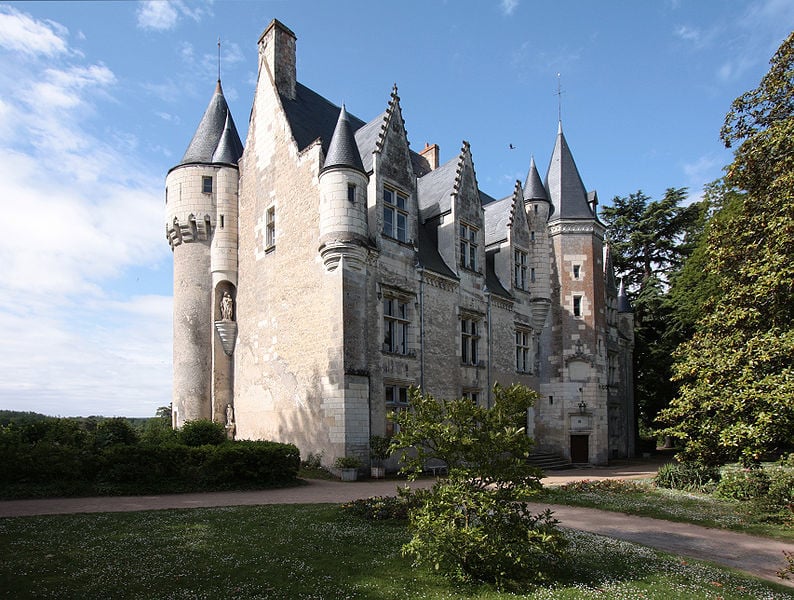
This being castle country, Montrésor does not disappoint. The Chateau de Montrésor sits up on the hill above the village. There are a handful of nice places to grab a pastry and coffee in Montrésor after you check out the castle.
Backpacking Chambord
One of the most famous castle structures in the world is the Chateau de Chambord. This massive castle which was never completed was constructed by King Francis, another rich guy from history with a deep love of high living.
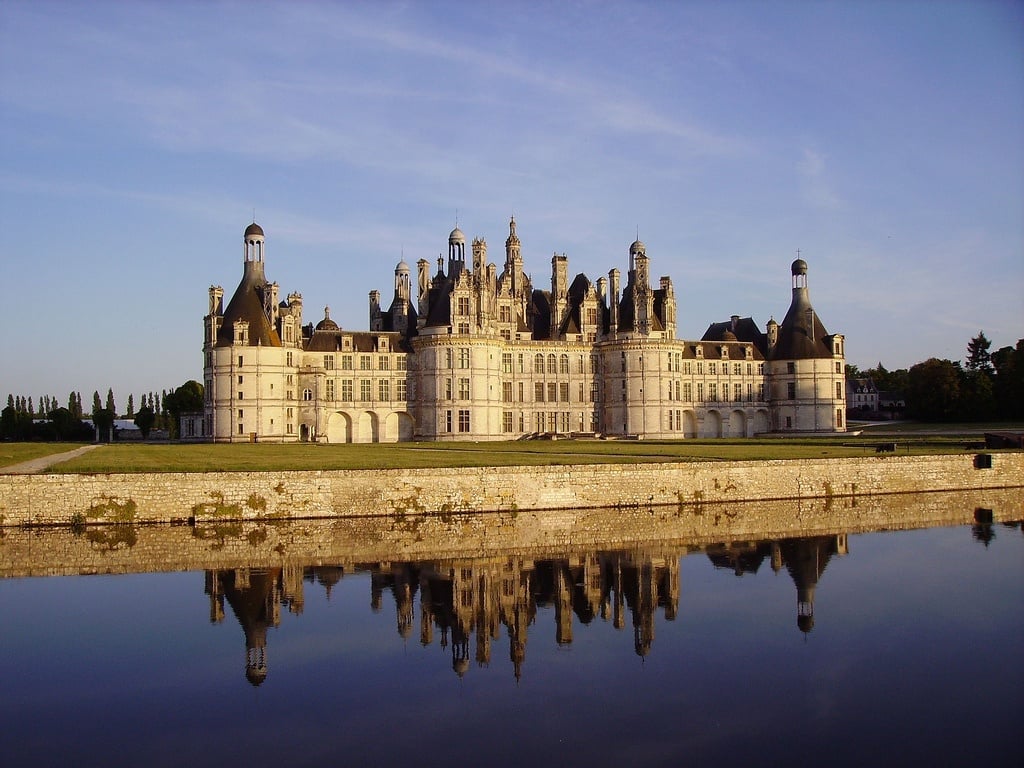
Due to its fame, Chambord is one of the most beautiful places in France. You certainly will not have the place to yourself, but if you go early in the morning, or around sunset, you will have far fewer people around. There is nothing in the way of accommodation at the castle (even though the castle has over 400 rooms). Chambord is 16km east of Blois, 45km southwest of Orléans and 18km northeast of Cheverny. The day trip to Chambord can easily be sorted from any of the previously mentioned towns.
Backpacking Orléans
If you have spent a lot of time bicycling or hitchhiking your way across the Loire Valley, then Orléans will be the taste of civilization you’ve been looking for. Orléans is considered the capital of the Loire region and offers up plenty of fun things to get into.
Tired of churches yet? The Cathédrale Ste-Croix is still pretty impressive even if you are suffering from church-visiting-burnout. Visit the Maison de Jeanne d’Arc (Joan of Arc), a reconstruction of the 15th-century house that hosted her between April and May 1429 (the original was destroyed by German bombing in 1940). Learn about the amazing life and times of one of France’s most badass women from history
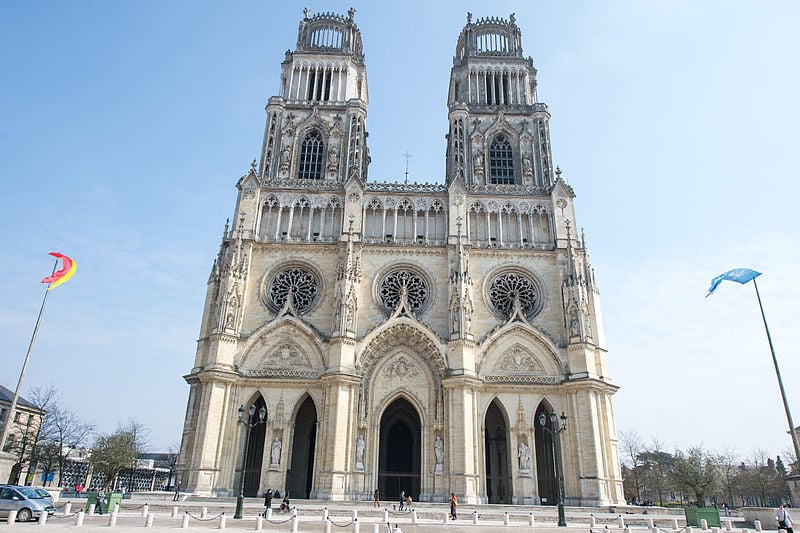
Orléans’ five-story fine-arts museum is a real treat. The museum features some of Europe’s finest painters from the last few hundred years.
Backpacking Marseille
The port city of Marseille has had a bit of a rough reputation in the past, but despite this, it’s still one of the best places to stay in France. While parts of the city certainly were (and are) a bit sketchy, these days Marseille is a safe and vibrant city. Marseille is France’s 2nd largest city and boasts and wealth of fun things to do both in the city and around.
Marseille’s public transportation is pretty solid so getting across the city is easy. Taking the underground metro is a great way to avoid the Marseillaise traffic!
What to do in Marseille
Start your exploration in the Vieux Port (Old Port). Marseille is one of the sunniest places in France, so almost any day is a good day to go for a walk around the port. Check out the surrounding Arabic neighborhoods and pop into a cafe for a strong Arabic coffee and a pastry or two.
The impressive Marseille Cathedral on the edge of the Vieux Port is worth a look. In August, when the afternoon sun is burning like hell, a trip to a cool, dimly lit church is always a good time.
Probably the most famous symbol of Marseille is Notre Dame de La Garde. This hilltop church sits in an inspiring elevated position above the city. You have to hike about a kilometer from the Vieux Port to reach the church, but you are rewarded with beautiful 360 views of the city and the sea.
There are two fun neighborhoods I recommend spending some time: La Painer and the Cours Julien. La Painer is a little artist enclave dotted with workshops, cafes, and tiny, charming streets. Marseille can be pretty loud and chaotic with traffic and people at times, but La Painer is a nice little refuge from all of that noise. This is a lovely place to stay in Marseille.
Cours Julien is Marseille’s hipster neighborhood. Tattoo shops, fun bars, hip cafes, music venues, and organic grocery stores make up some of the allure of the Cours Julien. There are also several great outdoor markets in the Cours Julien, selling everything from produce and bread to olives and pastries.
If you can swing the price, try Bouillabaisse in Marseille. This classic Marseillaise soup doesn’t get any fresher or tastier then it does from a seaside resto in Marseille.
This is also a great area to find some French yoga retreats.
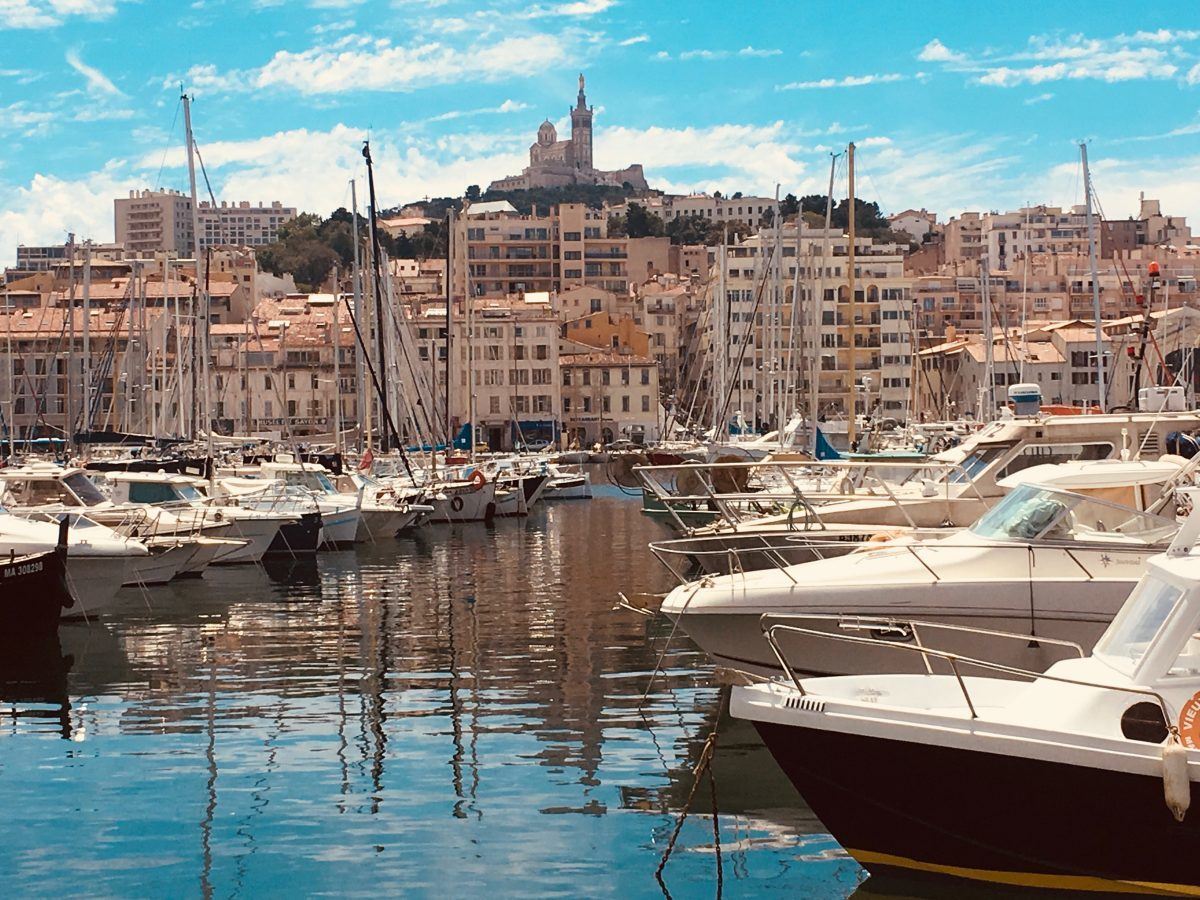
Photo: Chris Lininger
Read up on the best hostels in Marseille if you wanna roll through here on a budget.
Backpacking the Calanques
Located just a few minutes outside of Marseille, the Calanques National Park, one of France’s many national parks, is a true gem of the south. the Calanques are a series of dolomite and limestone formations, that stretch for miles along the Mediterranean coast. There are many hiking trails, beaches, and kayaking spots spread throughout the park. If you are into rock climbing, the Calanques feature some of France’s world-class rock at its most dramatic.
Among the many beaches and places to swim, Port Pin is my personal favorite. You can get there from Cassis in about 45 minutes walking. As the Calanques National Park is spread out over quite a big area, I recommend bringing enough food and water to see you through a long day of hiking or swimming.
There are several villages within the park, like Cassis for example if you want to eat at a restaurant or bakery. Note that these restaurants will be expensive, especially during the busy summer season.
Once you have explored Marseille for a couple of days, the Calanques provide the perfect venue to soak in some nature and that Mediterranean sun. Unfortunately, camping is not allowed in the park. You might be able to get away with it if you find a good hiding spot for your tent. However, park rangers do patrol quite frequently and you could receive a fine if you are discovered. Be careful with fire if you are cooking on a backpacking stove.
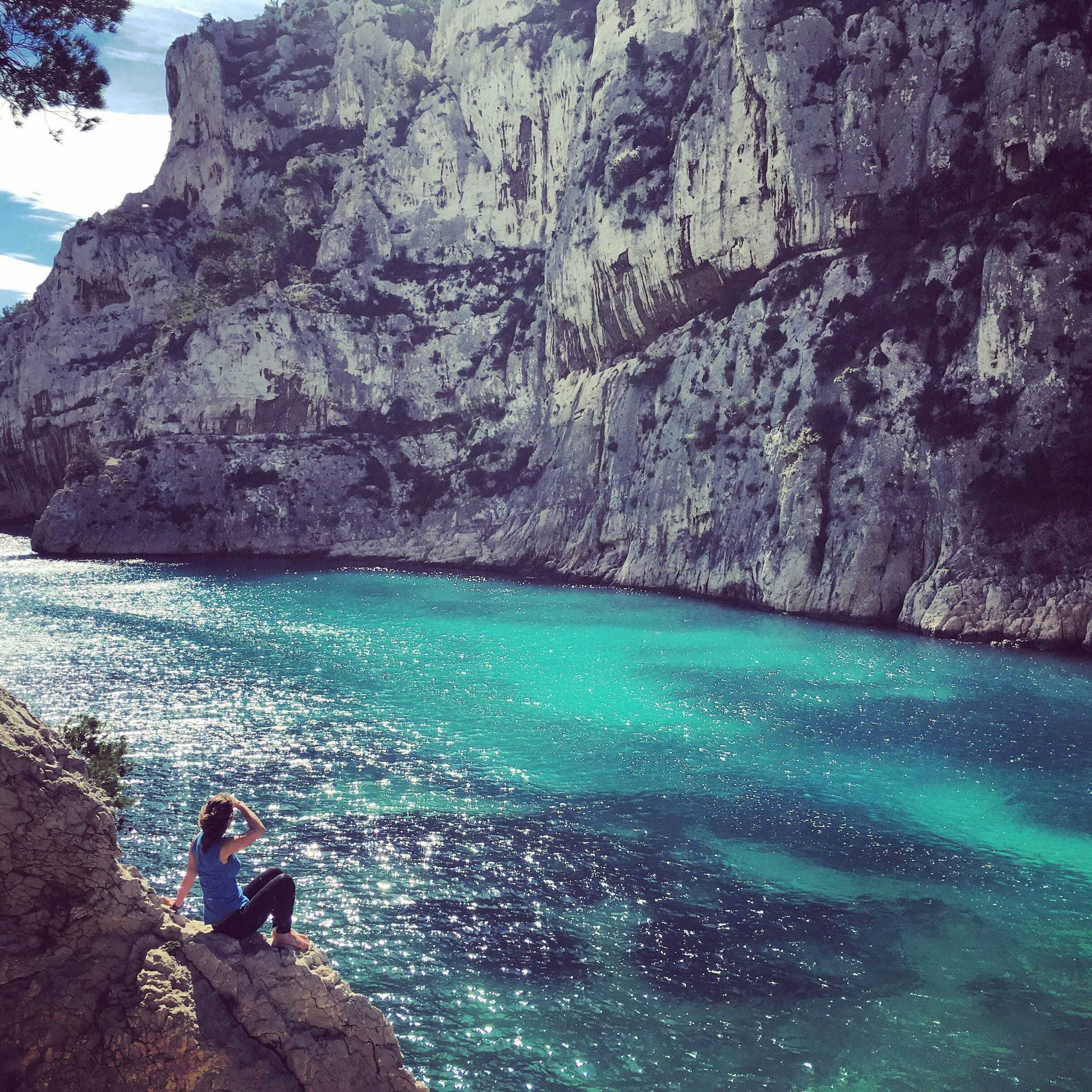
Photo: Chris Lininger
There are public buses going between Marseille and The Calanques daily.
Backpacking Hyères
The town of Hyères is nice enough, though it does not have a whole lot of excitement for backpackers. The main draw to Hyères is the islands off the coast. You can catch a ferry from the Saint-Pierre Port in Hyères to Port Cro Island for a steep 28 Euros return ticket.
The island has beautiful untouched beaches and some of the best snorkeling opportunities in all of France. There is nothing in the way of amenities on the island, so bring everything you need with you. The French Riveria can get very busy at times, but Port Cro Island offers a very different experience from the beaches around Nice.
If you’re not wanting to shell out the dough for the ferry, you do have an option. The Presqu’île de Giens (Giens Peninsula) offers up beautiful beaches and diving opportunities quite similar to what you would find on Port Cro Island.
Either place is a great option for getting some quality beach time in without the massive crowds found in other parts of the Mediterranean coast.
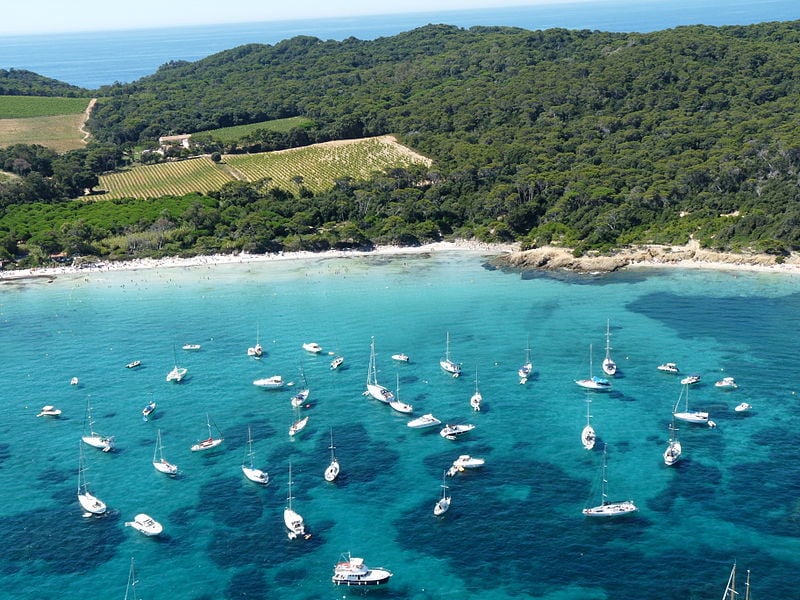
You can also catch a ferry from Toulon, nearby Hyères, to the island of Corsica. This island once hosted an exiled Napolean and is arguably one of the most beautiful in the Medditerranean. It’s extremely rugged and has some amazing hikes and beaches, for that matter.
Backpacking Aix-en-Provence
Aix, as locals call it is a medium-sized city about one hour north of Marseille. Aix is quintessential Provence, with its relaxed vibe, delicious food, and charming streets. When the warm sun starts to go down, the town really comes alive. At night, the (occasional) hordes of cruise ship tourists have retreated to the all-you-can-eat buffets of their ship and the locals begin to appear.
A walk through Le Cours Mirabeau is a good way to get the evening started. Stroll past countless cafes, fountains, pubs, and restaurants as they begin to open their doors for dinner. There is a small weekly market here where you can pick up delicious fresh fruit and veggies.
Aix en Provence neighborhoods are chill and fun to be around. The city is quiet, clean, and welcoming. Sometimes whilst you are backpacking France it is nice to roll into a town and not feel like you have to see and do everything. I would say there is not a lot of “must see” monuments other than the Cathédrale Saint-Sauveur and the beautiful fountains. The charm is in the cobblestone pavings and the small cafes.
The famous French painter Paul Cézanne lived and worked in Aix. Walk the streets that inspired some of Cézanne’s life and work.
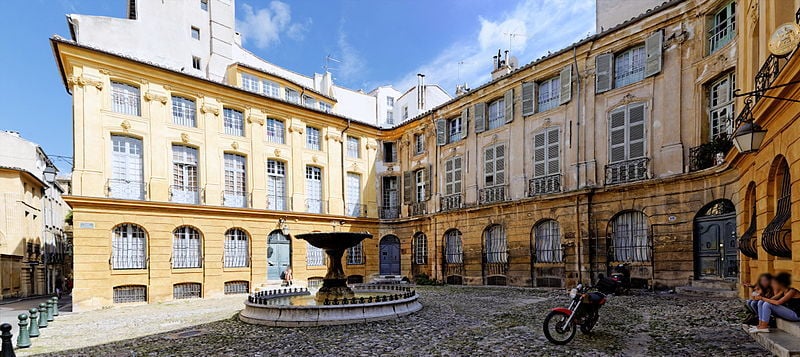
Backpacking the Verdon Gorge
The Gorges du Verdon is one of my favorite places in all of France. The Gorge is like a mini Yosemite/Grand Canyon hybrid. Towering limestone cliffs envelop a stunning river valley. The turquoise water of the river provides a beautiful contrast to the white chalky color of the cliffs.
The Gorges du Verdon is famous around the world as the birthplace of modern sport rock climbing. In addition to rock climbing, there are ample hiking and kayaking opportunities. A good portion of the river is protected due to an endangered fish species endemic to the area. You can hire a kayak (or battery powered boat) at the Lac de Sainte-Croix. You can kayak into the gorge for a few kilometers, park the boat and explore more on foot if you desire.
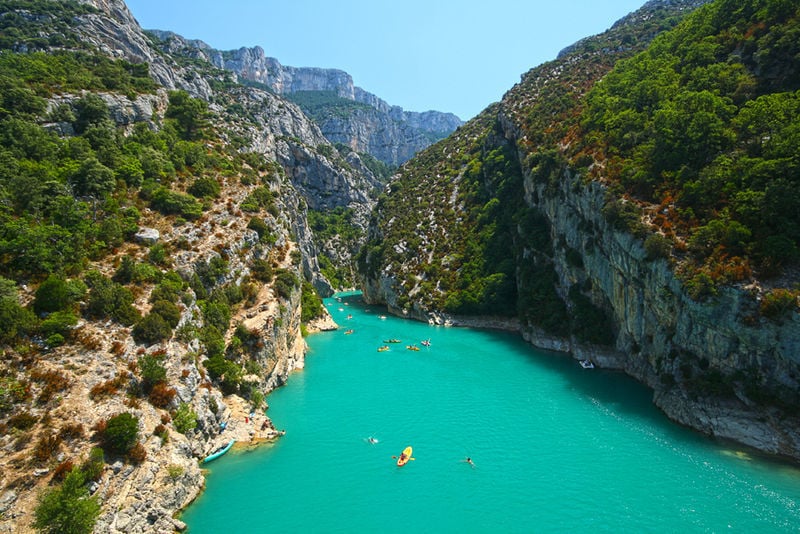
The George is quite large and there are many many places to hike. I recommend staying for at least a couple days. If you are into rock climbing, you will probably want at least one week (or one month!). Wild camping is also forbidden here. There are plenty of established campsites where you can pitch your tent for a few bucks.
Backpacking Les Cévennes
The Provence and Mediterranean coastal regions of France are great to see, but sometimes there are just too many people around! Once you have got your fill of Provence, head to Les Cévennes National Park. Here you will find plenty of places to hike, wild camp, swim, and kayak.
Most people who visit France will never hear about Les Cévennes. I love that about this area. Les Cévennes is simply not on peoples’ radar yet.
Of the many places to go for a hike, the impressive Tarn Gorge boasts towering limestone cliffs and is dotted with dreamy medieval villages. Hike Mont Lozère, the highest peak in the Cévennes National park. It is 1,699 meters above sea level and makes for a good ski hill in the winter.
The Saint-Étienne-Vallée-Française area is worth a visit as well. The Robert Louis Stevenson Trail (GR 70) runs right through town if you are looking to hike a section of it.
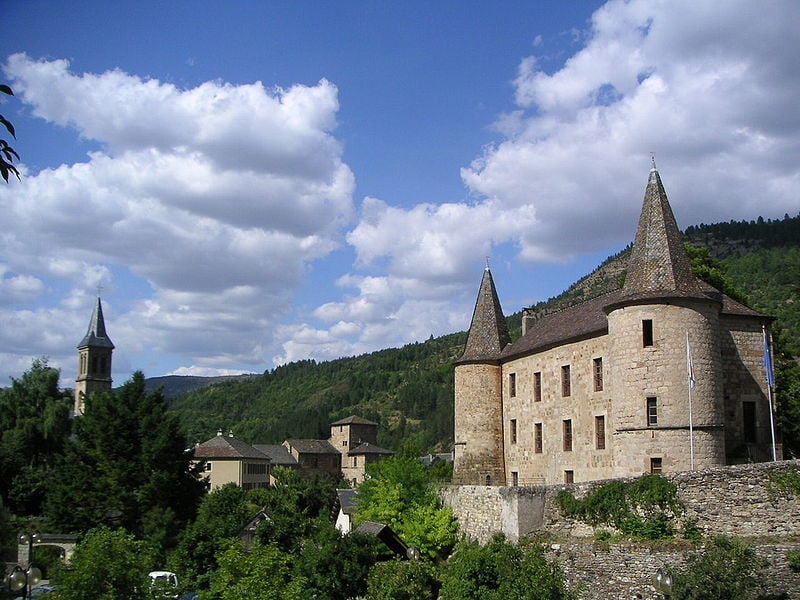
North of Les Cévennes is the Ardèche region. If you go to Les Cévennes then you must go to Ardèche. Ardèche is another place loaded with adventure possibilities off of the beaten track. Hike, camp, and explore until your heart’s content.
Backpacking Annecy
Since many places in the Alps are sparsely inhabited, the only big city close to the northern Alps is Annecy. If you are in between treks and want all the amenities of a city at your disposal, Annecy is your best bet.
One of the highlights of Annecy is the massive lake the town is built around. In the summer, one can spend all day just chilling out on the beach right on the lake. The medieval core of the city has the Thiou River running through it. The streets are a meandering combination of canals, colorful buildings, and little passageways.
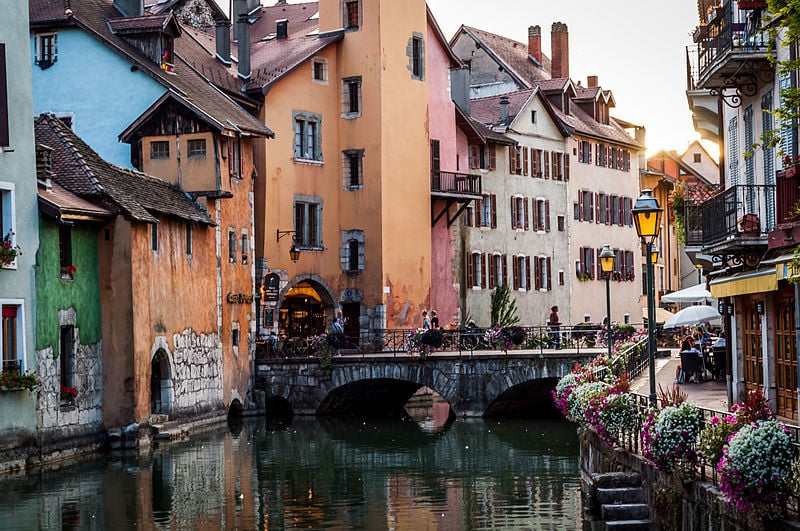
On Tuesday there’s a food market in the old center, which adds real color and energy to the old streets. The Savoie region is famous for its cheesy potato dishes. Dive headfirst into the raclette!
Backpacking Chamonix
If you have even the slightest interest in skiing, trekking, rock climbing, or mountaineering, then you have probably heard of Chamonix. Chamonix is the adventure capital of France and arguably the most important base for serious mountaineers in Europe.
No matter the season, the adventure activities in Chamonix focus around the mountains. If you are looking to take on one of the most epic hikes in the world, you have come to the right place. With a couple of great hostels in Chamonix, you can even visit the area on a budget.
Be sure to take the cable car up to the Aiguille du Midi for up close and personal views of Mt. Blanc, its glacier, and the surrounding snow capped peaks. It is worth the money (60 euros at last check).
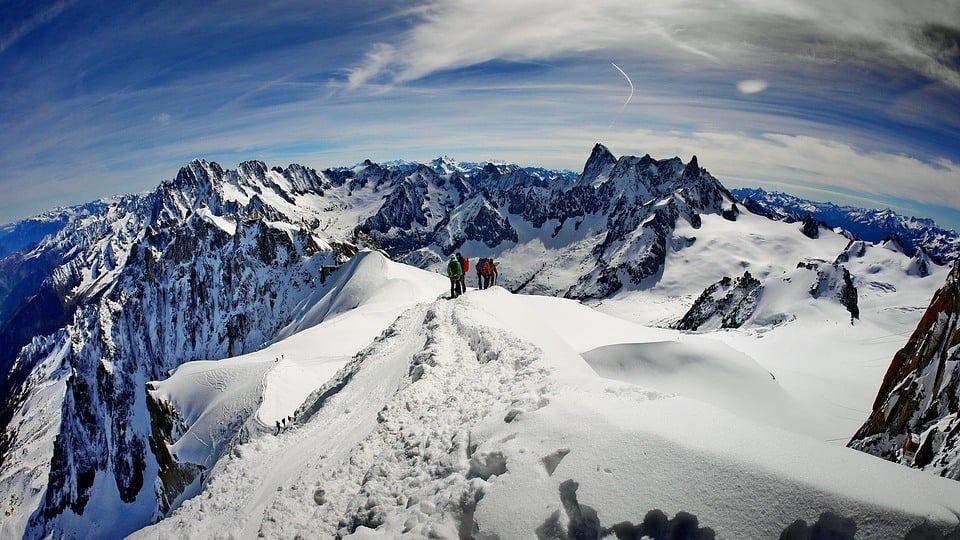
The Tour de Mont Blanc, a 170 km long hiking path that crosses the French, Swiss, and Italian Alps begins just south of Chamonix in Les Houches. This breath-taking hike may be popular, but for good reason. The views of the mountains, glaciers, wildlife, and snow-capped peaks are every bit as beautiful as you have heard. I had the time of my life doing the TMB (which took me 11 days to complete).
If the Tour de Mont Blanc hike isn’t for you, no worries! There is an endless amount of single and multi-day hikes to be had in the Chamonix/Mont Blanc region. Pick your poison. In the wintertime, Chamonix is geared towards all things snow. Whenever you visit you are going to spend time in these mountains and the beauty will leave you grinning like a fool for days.
The town of Chamonix has plenty of accommodation choices for all budgets. Booking in advance is a must any time of year. The backpacker hostels are popular and they book up fast!
Backpacking Alpes d’Huez
Another fantastic place to check out if you love skiing is Alpes d’Huez. Chamonix absorbs a ton of ski traffic throughout the season, so coming to Alpes d’Huez is bound to be a quieter time.
Winter is not the only time to visit Alpes d’Huez. In fact, the lifts to the highest peaks are open during the summer, and it is possible to take a mountain bike up with you. Marked trails are then available for the descent. Always wear a helmet if you plant to bomb the mountain on a bike!
Other summer activities in the area include rafting and rock climbing.
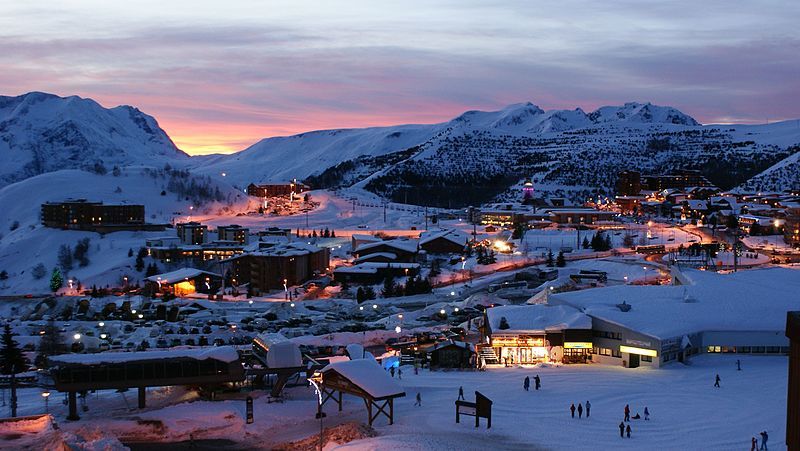
Getting out into the mountains from the town is easy if you want to get some trekking in. Alpes d’Huez is in the Isère department of the Rhone Alps, a one hour drive to the south-east of Grenoble if you are needing city time.
Bring your camping gear with you and you can set off into the hills to find the perfect spot to pitch your tent.
Getting of the Beaten Path in France
Let’s face it. France is one of the most popular travel destinations anywhere on earth. 85 million people visited France in 2013 (the most visitors any country received that year)! That said, there is still plenty of places to go where you won’t be surrounded by mobs snapping selfies.
There are a wealth of wild rivers, mountains, forests, canyons, and stretches of coast where you will find very few people. Luckily, the tourist hot spots are just that. The popular hot spots in France attract tourists like a magnet, leaving a majority of the country undisturbed by the great influx of visitors.
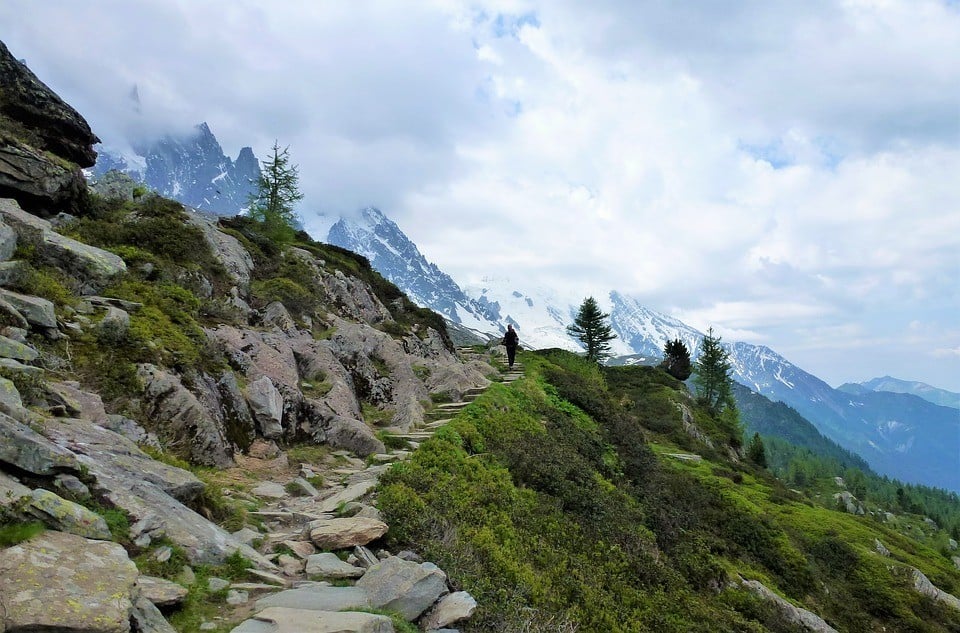
If you find yourself hitchhiking or trekking in the interior parts of the mountains, you will discover a side of France that few visitors ever get to see. Make sure to buy a sim card while exploring these remote areas of France to stay connected.
Visit some of the most beautiful villages in France and get to know what makes the place tick.
There is certainly plenty of magic to be found away from France’s main popular attractions. All go you need to do is explore a little and you will discover the hidden gems for yourself.
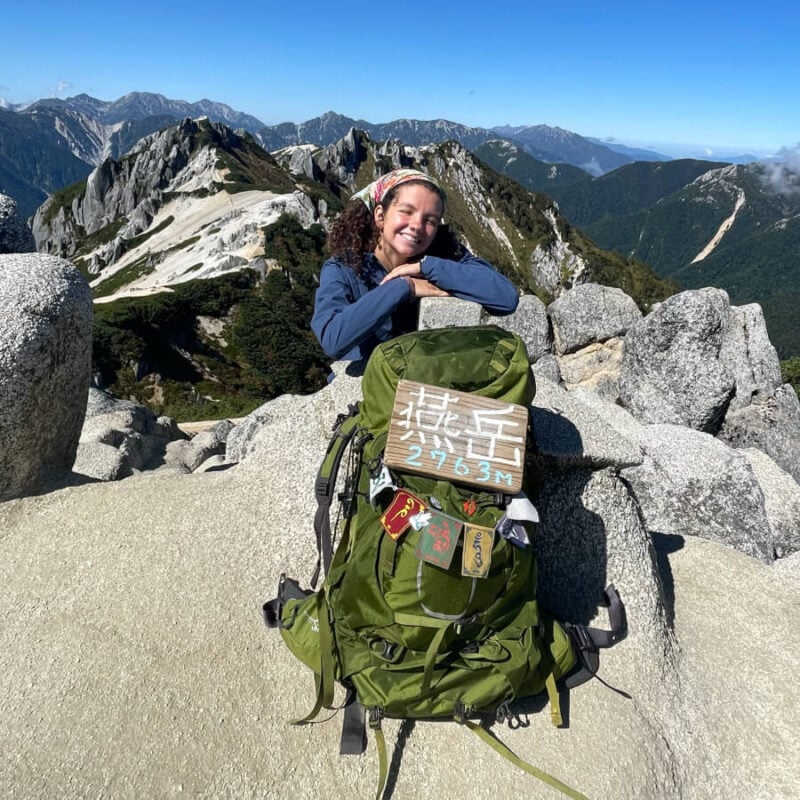
We’ve tested countless backpacks over the years, but there’s one that has always been the best and remains the best buy for adventurers: the broke backpacker-approved Osprey Aether and Ariel series.
Want more deetz on why these packs are so damn perfect? Then read our comprehensive review for the inside scoop!
View on OspreyTop Things To Do in France
Backpacking France offers up the experience to dive headfirst into a nation brimming with historical attractions, beautiful natural landscapes, and amazing culture.
I have listed the top 10 most popular and best things to do in France below to get your ideas flowing for your backpacking France trip!
1. Get Lost in Paris
This shouldn’t be too difficult. Paris is massive and there are a million things to do around the city. Discover for yourself what makes this famous capital so magical.
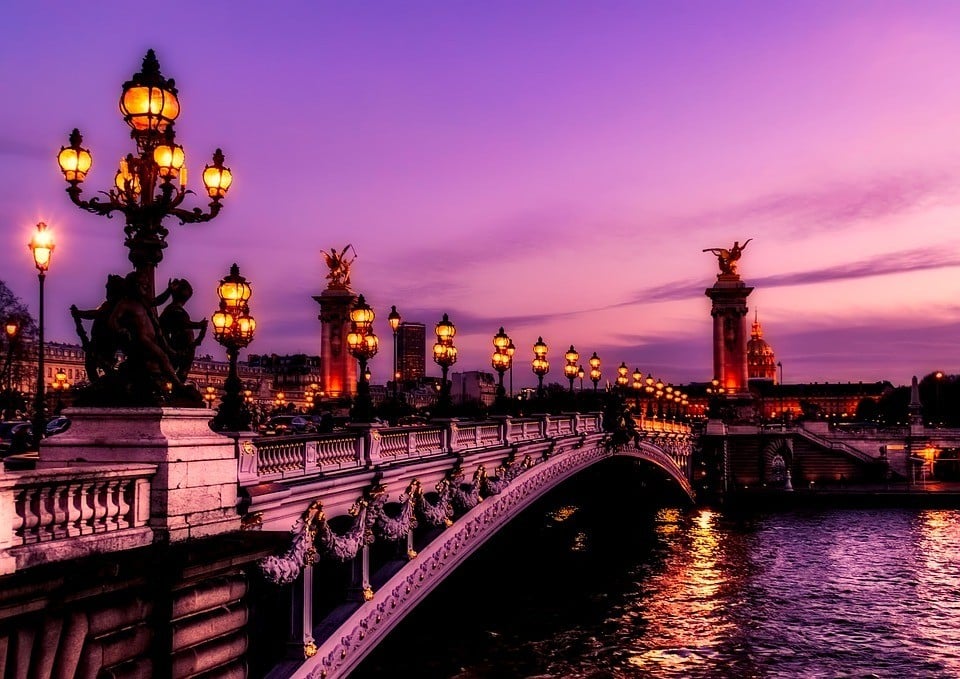
2. Trek in the Alps
If you have been paying attention, you will know by now that the Alps is home to some of the best trekking to be had in Europe. Pick a mountain and climb it!
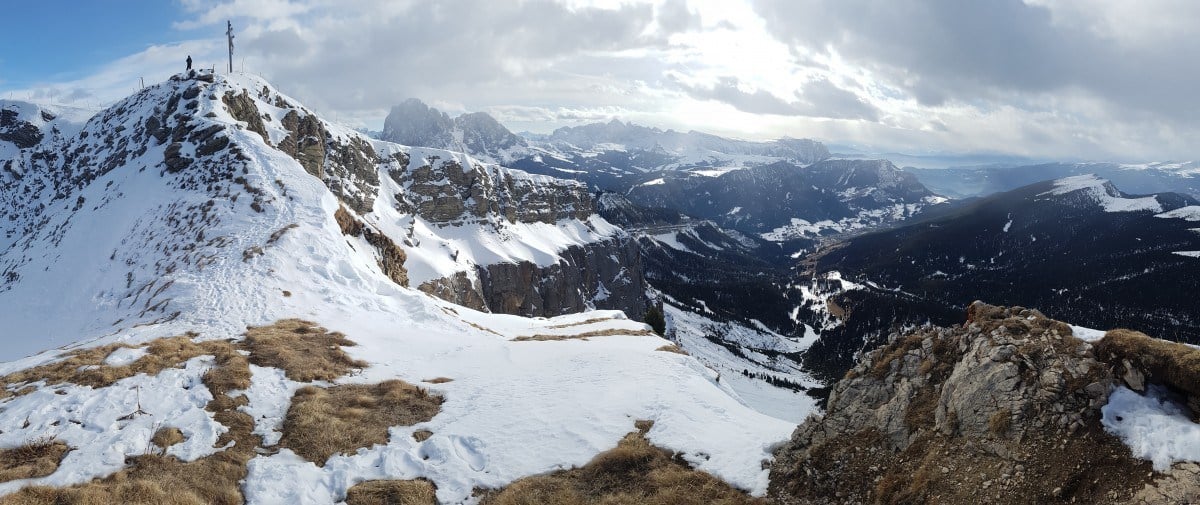
3. Visit some of the Most Beautiful Villages in France
The French love their certifications and this elite list is no different. Yes, there is an official list of the most beautiful villages in France. Every place I have visited on the list has definitely deserved to be on it.
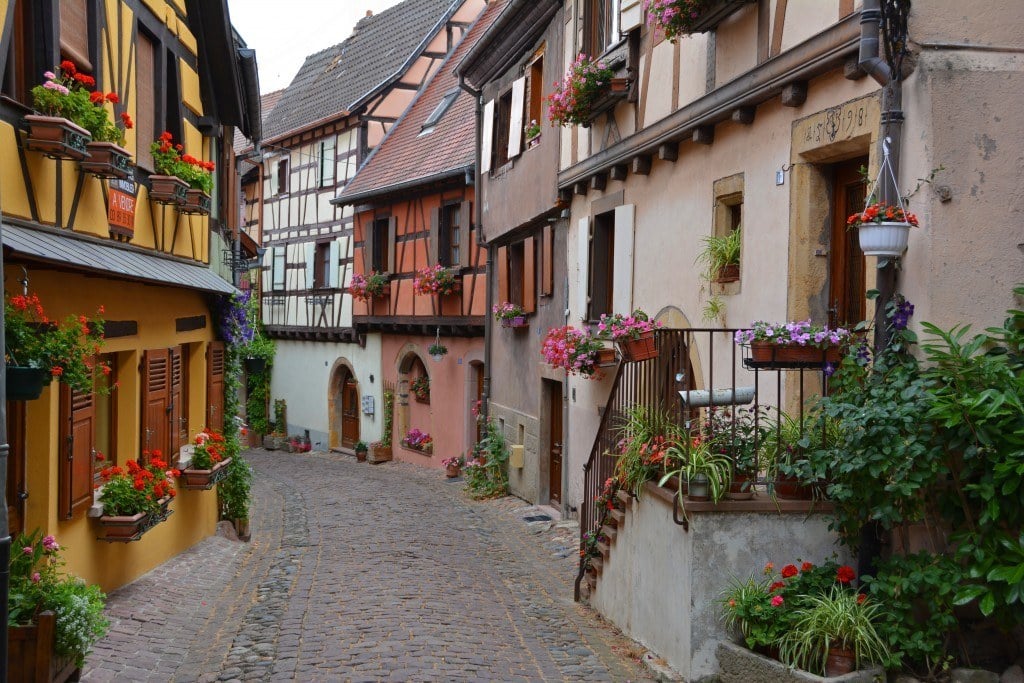
4. Stay in a Mountain Refuge
Scattered throughout the Alps and the Pyrenees are a series of mountain huts or refuges. These range in quality, though in general they are very well run and comfortable. Many of them even have a full-time kitchen and bar staff, so you can get a quality hot meal even when you’re out far in the mountains.
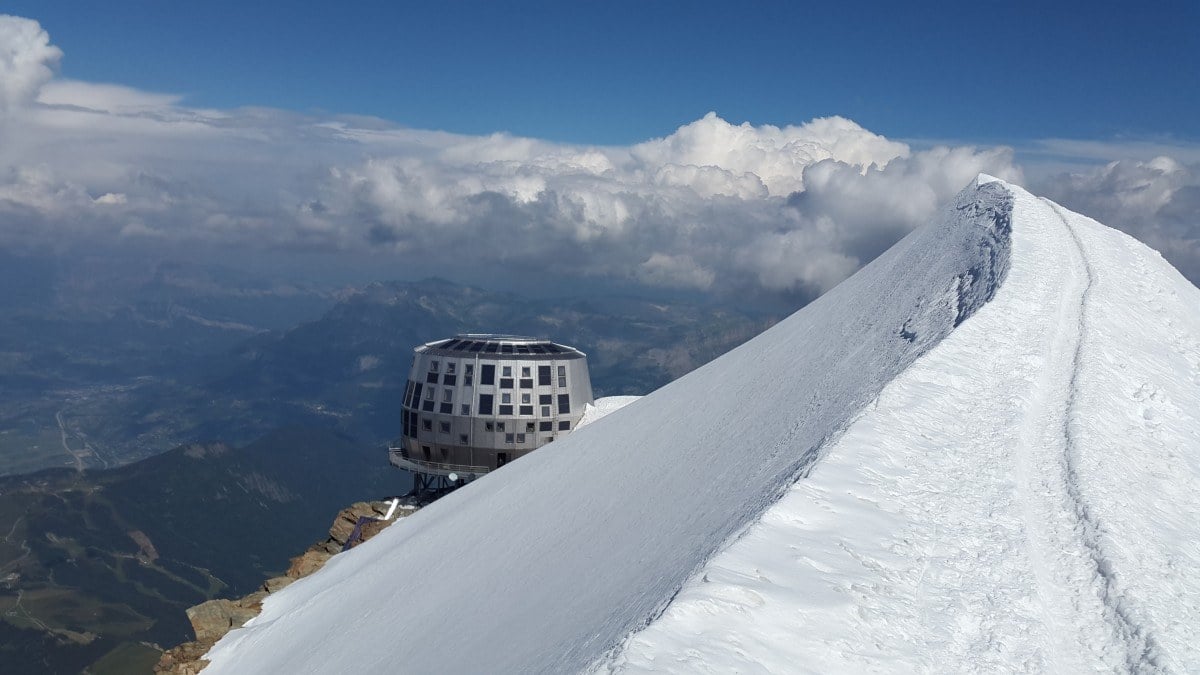
5. Drink French Wine
So many options, so little time… Touring French wine is stuff dreams are made of.
6. Learn French
Learning a bit of French will be a huge help during your time backpacking France. Spending time with locals is a great way to learn the basics.
7. Visit the Louvre
The Louvre is so damned impressive really. Yes, there will be heaps of other people, but it truly is a once in a lifetime experience to behold some of humanities greatest creations.
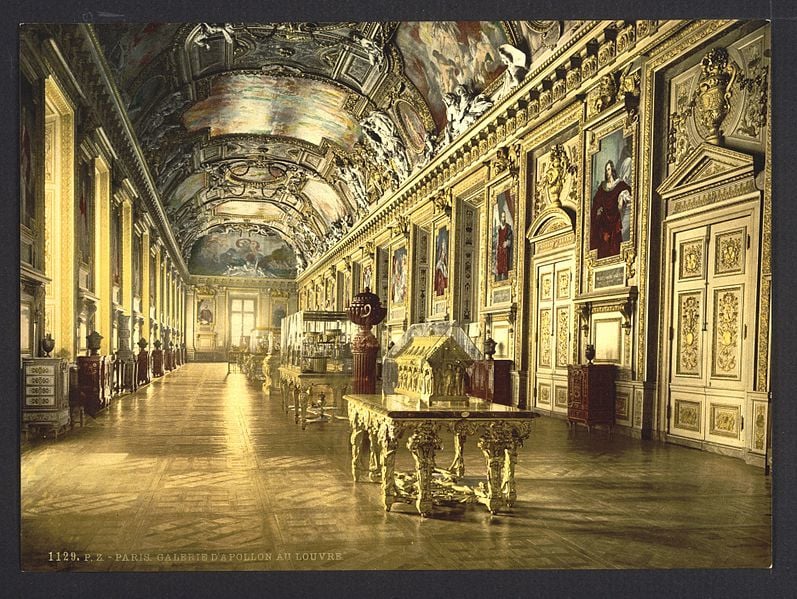
8. Go Skiing
France is famous the world over for its Ski stations. While it might be expensive to go for just one day, how often are you in the French Alps? If you love to ski budget accordingly so you can hit the slopes at least once.
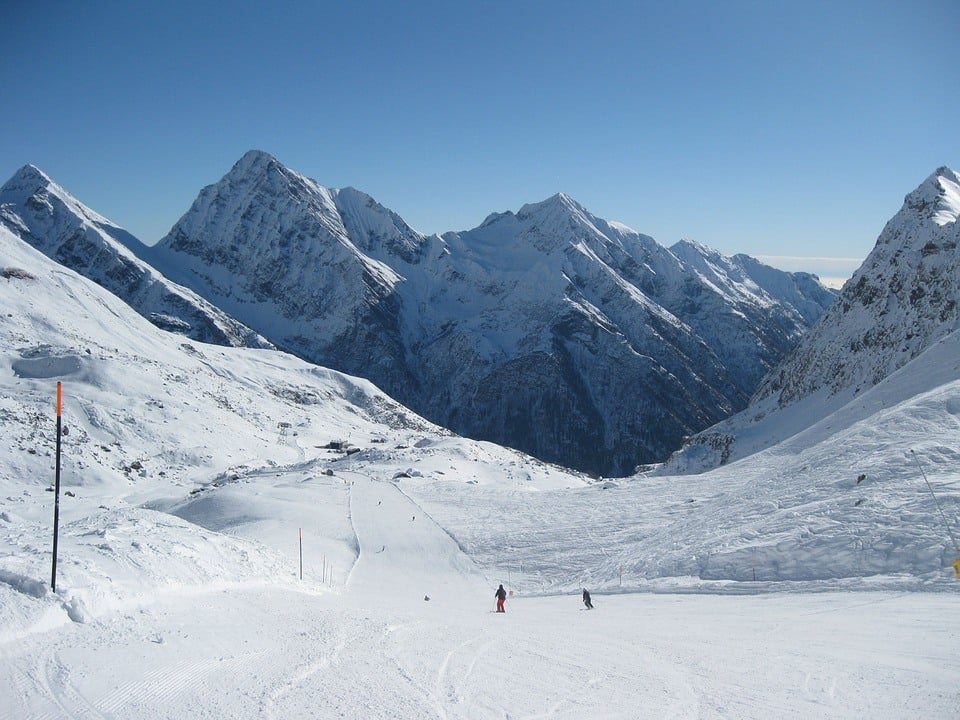
9. Eat as much French Cheese as you Can
They say that France has a different type of cheese for every day of the year. I think the real number is triple that amount. Every region produces its own distinct variety. The more places you go backpacking, the more cheese you will get to taste.
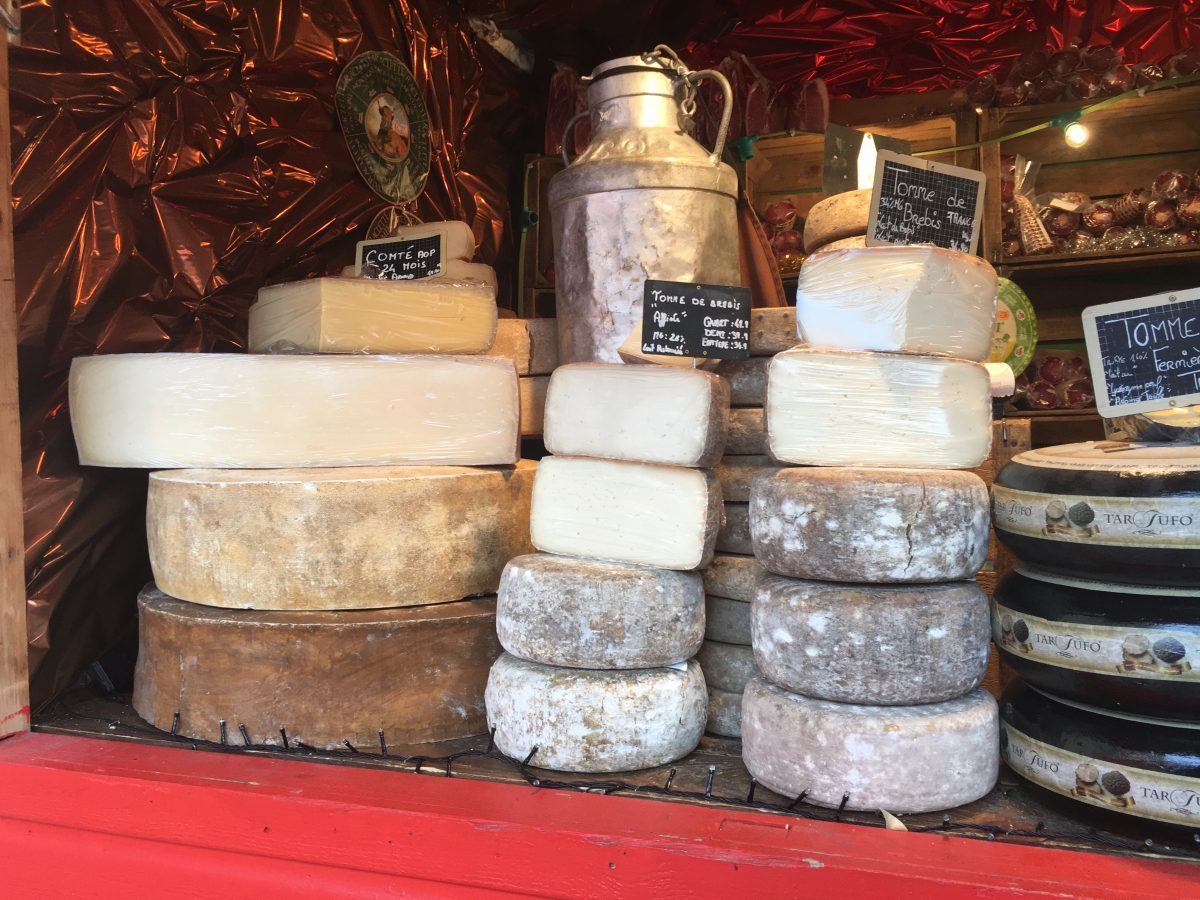
10. Party on the Mediterranean Coast
The south of France in the summertime can be one hell of a party. Check out the nightlife in some of the cities or go to a music festival on the Mediterranean coast. Cannes and also Nice are ultra glam destinations.
If you’re here you can also nip over to Monaco for the day. If you’re into country bagging then this is a fun one to tick off. But actually there are some really interesting and fun things to do here, plus some awesome hidden gems and it’s actually wild how different it feels.
For more awesome things to do in Europe, check out my friend Leanne’s ultimate Europe bucket-list!
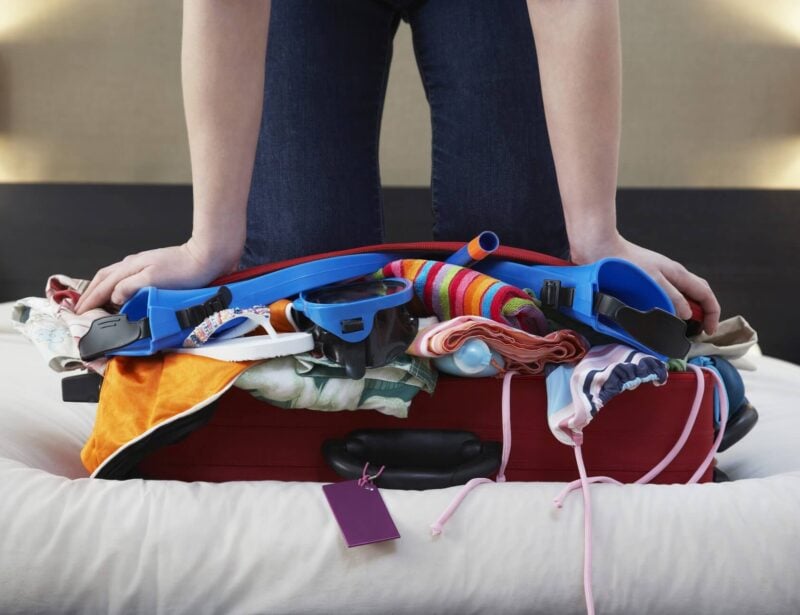
Wanna know how to pack like a pro? Well for a start you need the right gear….
These are packing cubes for the globetrotters and compression sacks for the real adventurers – these babies are a traveller’s best kept secret. They organise yo’ packing and minimise volume too so you can pack MORE.
Or, y’know… you can stick to just chucking it all in your backpack…
Get Yours Here Read Our ReviewBackpacker Accommodation in France
France is a country well versed in receiving travelers. As one of the most visited places in Europe, the French know a thing or two about hospitality.
In most cities and towns, you can find backpacker hostels. The prices can depend on the season and the location. Hostels in Paris will certainly be more expensive than a hostel in a small French village. That said, I found the average price for a night in a hostel to be around $24 (20 Euros).
If you’re looking for somewhere with more homely comforts or you decide to stay somewhere for a while, consider checking out these Airbnbs in France for some affordable options.
Of course, hostels are great places to meet other travelers, grab a shower, and take a general breather from the road. You might not need one every night, but there will never be a shortage of options.
Booking in advance isn’t always necessary, however, the popular (and cheaper) hostels book up fast, especially during the holidays or in summer. The Mediterranean coast is notorious for this! People from all over Europe flock to the French beaches come summertime, so book ahead if you want to score a nice place! Same goes for French Alps when ski season is in full swing.
Also gaining momentum with travelers backpacking France are camper vans. Many travelers are using vans to see the country in a more dynamic way, snoozing wherever they end up. Sleeping in your car, and overnight parking are both legal practices in France, unless there is a sign posted clearly stating that you may not. These conditions make using a camper van a very fun option.
France is also a world-class wild camping destination. There are places where there is no budget accommodation available. Packing a quality tent is the best way to assure that you will have a comfortable and free place to sleep when there are no other options.
The Best Places To Stay in France
To help you find the absolute best places to stay in France during your backpacking adventure, check out our in-depth article on the best hostels in France. For more remote and adventurous options, here’s our list of epic treehouses in France, and you’ll be surprised to see that many fit a backpacker’s budget!
| Location | Accomodation | Why Stay Here? |
|---|---|---|
| Paris | Arty Paris | Close to all the main attractions. A cheap hostel by Paris standards, yet still very well maintained. |
| Amboise | Gite Nilou | Not much in the way of budget accommodation in Amboise, so this is your best bet. |
| Montrésor | Chateau-monastère de La Corroirie | This place is beautiful, but due to the price, I’d say it is best split with a couple of your mates. |
| Blois | Ethic Etapes Val de Loire | Great prices and warm environment. Really, you got to jump hostels this cheap in France! |
| Orléans | Suite-Home | In my opinion, this place might be too fancy. However, Orléans is lacking in department of cheap hostels… |
| Marseille | Vertigo Vieux Port | The Vertigo Vieux Port just received a brand new renovation! They are located in the Old Port area, walking distance from beaches, bars, clubs, the central market and the famous Notre Dame church. |
| Cassis | Best Western Hotel & SPA Coeur De Cassis | This property is gorgeous and had lots of different room sizes available. |
| Hyères | La Cigale Varoise – Hyères La Plage | Close to the beach, this spot is perfect if you want to stay a stone’s throw form the sea. |
| Aix-en-Provence | B&B Villa Roumanille | Fast, free WiFi and free breakfast. Great location and bright rooms. |
| Verdon Gorge | Hôtel Restaurant le Saint Marc | Killer restaurant and comfortable beds. This place is about 15 mns. by car to the lake. |
| Les Cevennes | Gite Mas Des Combes | If you are going to experience staying in a Gite in France, this isn’t a bad place to do it. |
| Annecy | Annecy Hostel | Everything there is to see in Annecy is within waking distance. Fair prices and fun staff. |
| Chamonix | Chamonix Lodge | Whenever a hostel offers a hot tub and sauna, I am going to recommend them. Have a good soak after spending time in the mountains! |
| Alpes d’Huez | Moontain Hostel | The perfect place to base yourself for all of your outdoor adventures… |
| Lourdes | Hotel Croix des Nordistes | Solid onsite restaurant and tidy, comfortable rooms. |
| Lyon | Away Hostel and Coffee Shop | Beautiful modern hostel/cafe with some of the best dorms in France. |
| Bordeaux | Hostel 20 Bordeaux | One of the only budget backpackers in Bordeaux. A cozy little hostel in the center of town. |
| Dijon | Chambre d’hôtes Le Petit Tertre | Free breakfast and gorgeous 18th century style decor. |
| Grenoble | Good Vibes | Great home away from home that won’t break the bank. |
| Toulouse | La Petite Auberge de Saint-Sernin | Fun party hostel with awesome staff and clean, straight forward rooms. |
| Nantes | CIS Nantes Le Spot | Great hostel with spacious rooms and free luggage storage! |
France Backpacking Costs
Backpacking in Europe is always going to be more expensive than backpacking in Thailand for example.
Staying in hostels every night, partying it up, eating out for every meal, and booking last minute trains will certainly eat a big hole in your budget. Backpacking France is no different. paris can get expensive fast!
I recommend Couchsurfing as much as you possibly can. The more you Couchsurf and hitchhike, the more money you can spend on wine and cheese. Pure and simple. Also, having a good tent and sleeping bag will help save you a ton of money on accommodation.
A Daily Budget For France
| Expense | Broke Backpacker | Frugal Traveler | Creature of Comfort |
|---|---|---|---|
| Accommodation | $12 | $25 | $60 |
| Food | $8 | $17 | $30 |
| Transport | $4 | $6 | $15 |
| Nightlife | $10 | $20 | $30 |
| Activities | $10 | $17 | $30 |
| Totals per day | $44 | $85 | $165 |
I would say that it is entirely realistic to backpack France for as little as $30 USD a day, for most of your days here traveling around. If you are really on a budget you could swing $15-20 USD a day, but that might be pushing it.
Remember, budget focused backpacking is all about managing needs vs. wants. It is ok to deprive yourself of luxury. I have found that most good things in life don’t cost that much money anyway.
Money in France
France’s currency is the Euro (EUR). ATM cash machines are widely available throughout the country. Major credit cards are widely accepted, but carrying a bit of cash on you is best. Cash is typically the only way to pay at outdoor markets, food stalls, small bakeries, and public buses.
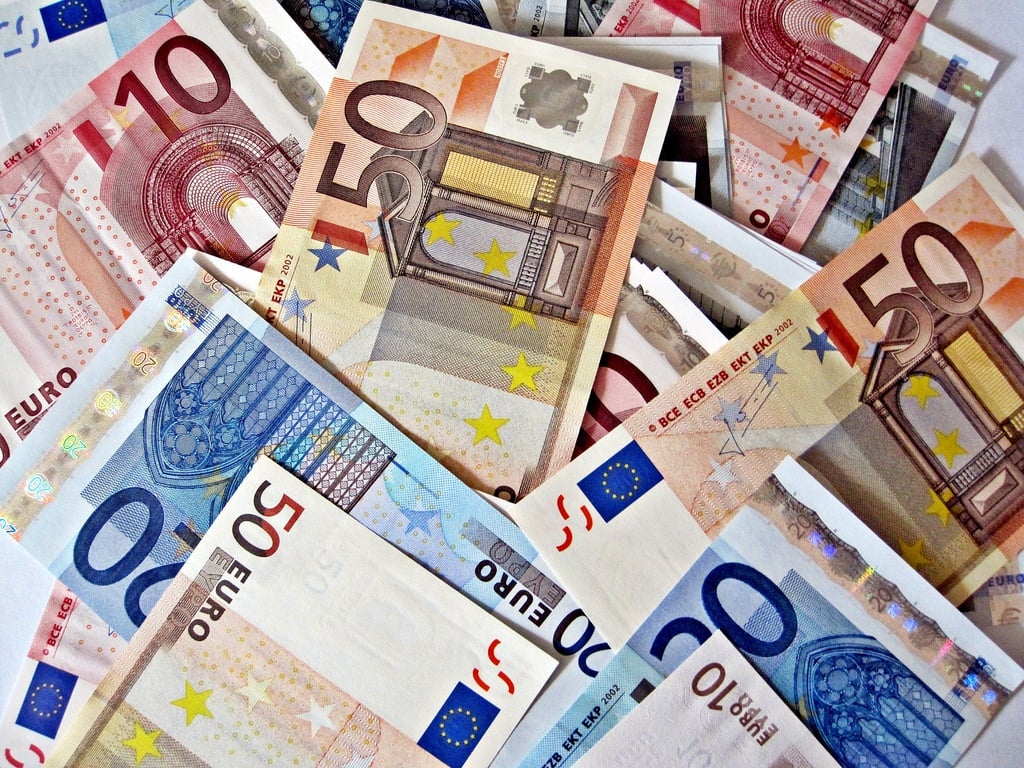
Travel Tips – France on a Budget
Camp: With plenty of gorgeous places to camp, France can be a great place to camp in the rural areas. While wild camping is totally illegal in France, you can still find some pretty remote places to camp for free. Check out this post for a breakdown of the best tents to take backpacking. Or, if you’re feeling really adventurous and want to save some cash, consider picking up a backpacking hammock.
Cook your own food: Travel with a portable backpacking stove and cook your own food to save some serious cash whilst backpacking across Europe.
Book your transportation early: Both plane and train tickets are much cheaper if you purchase them in advance.
Couchsurf: French folks are awesome. Get to know some! Check out Couchsurfing to make some real friendships and see this country from the perspective of locals.
Pack a travel water bottle and save money every day!
Why You Should Travel to France with a Water Bottle
Plastic washes up on even the most pristine beaches… so do your part and keep the Big Blue beautiful
You aren’t going to save the world overnight, but you might as well be part of the solution and not the problem. When you travel to some of the world’s most remote places, you come to realise the full extent of the plastic problem. And I hope you become more inspired to continue being a responsible traveller.
Plus, now you won’t be buying overpriced bottles of water from the supermarkets either! Travel with a filtered water bottle instead and never waste a cent nor a turtle’s life again.
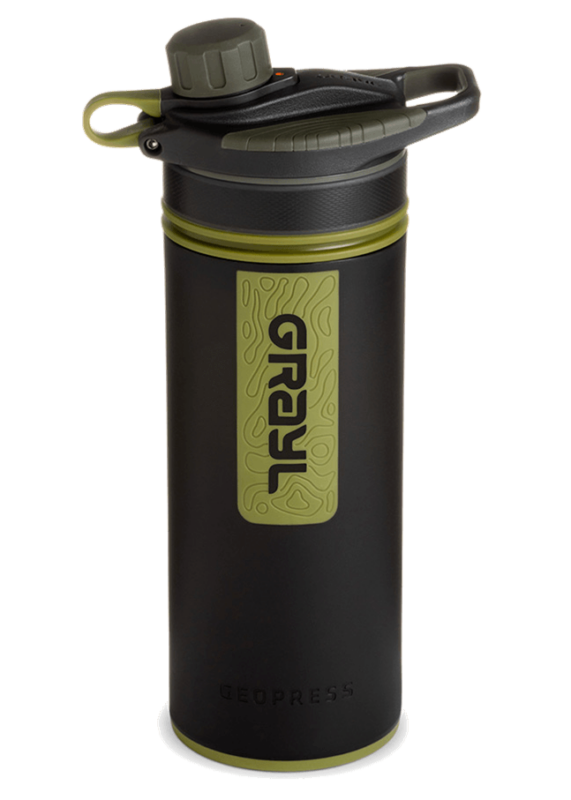
Drink water from ANYWHERE. The Grayl Geopress is the worlds leading filtered water bottle protecting you from all manner of waterborne nasties.
Single-use plastic bottles are a MASSIVE threat to marine life. Be a part of the solution and travel with a filter water bottle. Save money and the environment!
We’ve tested the Geopress rigorously from the icy heights of Pakistan to the tropical jungles of Bali, and can confirm: it’s the best water bottle you’ll ever buy!
View on REI Read the ReviewAnd Speaking of Plastic… Get an eSIM For France
You know those tiny pieces of plastic you used to use to connect yourself to the internet abroad? Sim Cards I think they were called? Well yeah, we’re ditching those as well.

These days, wherever you go in the world an eSIM is by far the best way to stay connected from the minute you land. You can download an eSim before you leave home and then activate it when you are still sitting on the plane waiting to disembark.
You skip all the hassle of trying to figure out different providers and navigating airport prices to make sure you’re not getting scammed.
Of all the many eSim providers out there, we suggest Jetpac. Jetpac works just like an app: you download it, pick your plan, and BOOM! You’re connected before the pilot says you can stand up.
JetPac eSim Packages For France
1GB – 4 Days – $1
5GB – 30 Days $7
10GB – 30 Days – $12
Best Time to Travel to France
France is one of the most traveled to destinations in the world. The summertime in Paris is crazy busy with tourists. Millions of people come to France every year to soak up the sights and sounds. Summer brings the warmest temperatures and also the masses of humanity.
The beaches around Marseille and Nice get slammed every summer also. However, there are usually spots to go where there are fewer people. You just have to explore a bit!
The winters in the north of France can be brutally cold. Like minus 20 C cold. Wintertime in the mountains can also be a very crowded period. Skiing is a very popular sport in France and the Alps are the most popular mountain range in the world to ski in.
That said, any time of year in France, there is something awesome to do. If you struggle with hot daytime temperatures and crowded cities, think twice before arriving in August.
My favorite time in France is the spring. The temperatures are mild. The days are getting longer. All of the flowers and trees are starting to produce color.
In the most popular and famous destinations in France, crowds are to be expected all year. Summer is the busiest, but even then one can escape and find a bit of peace and their own slice of paradise.

Festivals in France
Music and Food festivals reign supreme in France! Food festivals are typically seasonal based on the food the festival is celebrating. Summertime is primetime for music festivals.
Festivals can range in size to small quiet parties in a village to raging multi-day gatherings with thousands of people. Fun fact: word has it that secret raves happen in the Catacombs below Paris from time to time!
Festival des Escargots (April): Celebrates the famous ‘escargot’, but with a twist – cooked Alsace-style. The festival runs April 29th-30th.
The Mirabelle Plum Festival (August): This two week festival in Metz celebrates all things plum as well as other local specialties.
Paris Chocolate Fair (October/November): If you love chocolate and you want to be overwhelmed by more chocolate than you have ever seen, this fest is for you.
For a full list of gastronomic based festivals in France check out this website.
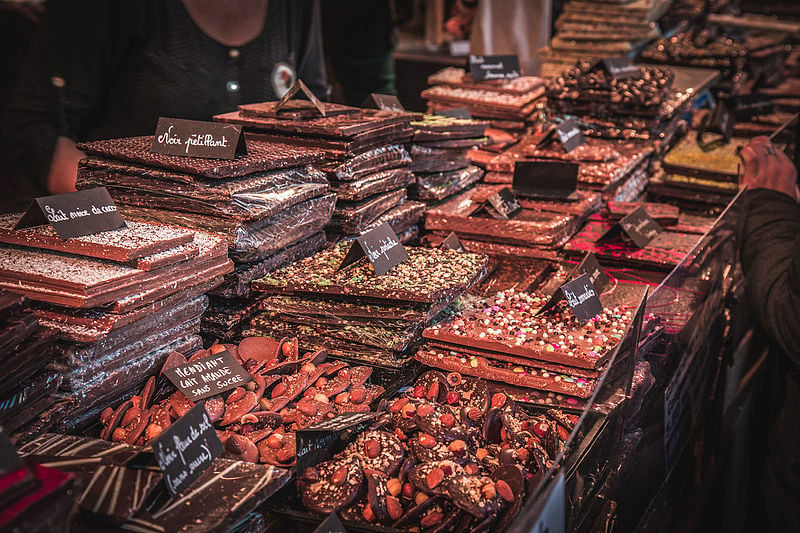
Music Festivals in France
Fête de la Musique (June): This festival is a country-wide celebration of music. The streets and parks of Paris can really get going with super talented musicians. The festival usually happens around the summer solstice.
Calvi On The Rocks (June): Calvi On The Rocks is an electronic music festival set on the islands stunning coastline and plays host to some of the top artists of house, techno and alternative music over six days. This festival takes place on the beautiful island of Corsica!
Worldwide Festival (July): Based in a normally sleepy Mediterranean fishing town, next to Montpellier, Worldwide Festival transforms Sete into a sun-soaked party haven for one week, and has been doing so for the last 11 years.
Peacock Society Festival (July): This ‘ Festival des cultures électroniques’ is hidden in the heart of Paris’s biggest wood and has been since 2013. The two-day festival takes place inside two huge warehouses designed by the famed architect Victor Baltard.
Jazz Festival (July): The Provençal hill-top town of Tourrettes hosts an annual jazz festival each year.
Electrobeach (August): The biggest electronic festival in France will hit the south coast resort of Barcarès this summer. Global stars of house, EDM, and trance will play to over 100,000 festival-goers on the shores of the Mediterranean. Sounds like a big fucking party aye?
Rock En Seine (August): This festival is famous across Europe and for good reason. Rock En Seine in Paris attracts thousands of people every year to this multi-genre music feast.
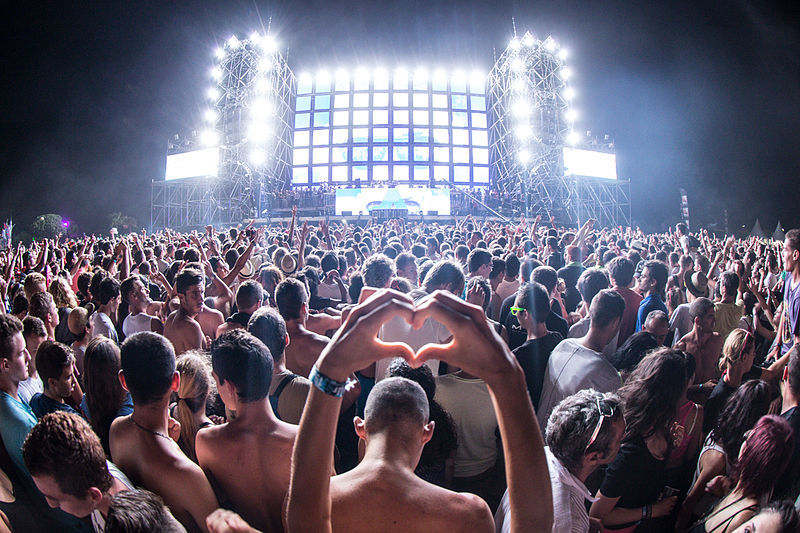
What To Pack For France
Travel Security Belt
This is a regular looking belt with a concealed pocket on the inside – you can hide up to twenty notes inside and wear it through airport scanners without it setting them off.
Microfiber Towel
Hostel towels are scummy and take forever to dry. Microfibre towels dry quickly, are compact, lightweight, and can be used as a blanket or yoga mat if need be.
Petzl Actik Core Headlamp
A decent head torch could save your life. If you want to explore caves, unlit temples, or simply find your way to the bathroom during a blackout, a headtorch is a must.
‘Monopoly Deal’
Forget about Poker! Monopoly Deal is the single best travel card game that we have ever played. Works with 2-5 players and guarantees happy days.
Hanging Laundry Bag
Trust us, this is an absolute game changer. Super compact, a hanging mesh laundry bag stops your dirty clothes from stinking, you don’t know how much you need one of these… so just get it, thank us later.
Staying Safe in France
France is one of the safest countries I have ever traveled in. That said, there is always the possibility for trouble or danger in any place on earth. Use common traveler sense. Avoid being out late, drunk, and alone. Don’t venture into the outskirts of Paris or Marseille at night unless you know where you are going.
As in any city, watch for petty theft/pick-pocketing while visiting touristy areas in Paris and the other big cities. To avoid pick-pocketing, be aware of your surroundings, and don’t carry a wallet in your back pocket. Watch out for strangers coming up to you with petitions and signs; this is usually just a distraction to steal your stuff. If you are renting a car, keep valuables out of sight!
If you plan to do some trekking, always plan your route and be prepared with the right gear. Check the weather forecast before you strike out. Hiking with at least one other person is definitely the responsible thing to do.
Pick yourself up a backpacker security belt to keep your cash safe on the road, and check out Backpacker Safety 101 for tips and tricks to stay safe whilst backpacking France. This post for plenty of ideas on ingenious ways to hide your money when traveling.
I strongly recommend traveling with a headlamp whilst in France (or anywhere really – every backpacker should have a good headtorch!) – check out my post for a breakdown of the best value headlamps to take backpacking.
Sex, Drugs, and Rock ‘n’ Roll in France
The big cities in France will certainly cover all of your clubbing and partying needs if you are looking for that. In general, the French have a culture deeply rooted in alcohol. That said, drinking in moderation is normal practice. Taking shots of vodka and slapping your mate on his shirtless back would definitely be out of place.
In the summer, the Mediterranean coast can see some pretty wild party nights. When the French party, they are not drunk and home by midnight. Usually, they pace themselves quite well. Staying out until sunrise on the weekends (and not getting completely shit housed) is pretty standard.
Weed is fairly common in France. I would suggest not buying any weed or other drugs from strangers on the street. You never really know what you will get or if the people selling it are cops. If you are looking to score some smoke or other party favors, your best bet will be a local connection or at one of the many music festivals.
Travel Insurance for France
Traveling without insurance would be risky so do consider getting good backpacker insurance sorted before you head off on an adventure.
ALWAYS sort out your backpacker insurance before your trip. There’s plenty to choose from in that department, but a good place to start is Safety Wing.
They offer month-to-month payments, no lock-in contracts, and require absolutely no itineraries: that’s the exact kind of insurance long-term travellers and digital nomads need.
SafetyWing is cheap, easy, and admin-free: just sign up lickety-split so you can get back to it!
Click the button below to learn more about SafetyWing’s setup or read our insider review for the full tasty scoop.
How To Get Into France
There are a variety of ways to begin your journey backpacking France. If you are flying in from overseas or another country in Europe, then you will probably land in Paris. Paris has three major airports.
Charles de Gaulle is the main international airport of Paris and all of France. Orly International airport sees the second most passenger traffic. Small, budget airlines typically fly into Beauvais-Tillé Airport.
If you are booking connecting flights from one of Paris’ airports double check that one of the flights you booked isn’t from an airport across town!
All of the major Airports in Paris are connected by train to the city center and to other regions in France.
Entry Requirements For France
EU citizens will only need their passport to enter France. Citizens of Australia, Canada, Israel, Japan, New Zealand, Switzerland, the US, and a handful of other countries do not need to pre-apply for a visa; their valid passport will be stamped on arrival. Other nationalities will need to apply for a Schengen Visa beforehand to visit all Schengen zone countries.
As a non-European traveler, you can only stay in France and other Schengen Zone countries for three months out of every six months. Once six months have passed from your original arrival date, the visa resets, and you’ll need to get creative if you want to travel long-term in Europe.
What the Hell are Schengen Area Countries?
The Schengen visa can be a bit confusing because not all European countries are part of Schengen zone. Greece, Germany, Spain, Portugal, France, Belgium, the Netherlands, Italy, Scandinavian countries, Hungary, Czech Republic, etc. are part of the Schengen zone. A few other countries – namely Switzerland, Iceland, and Norway – are not technically associated with the EU, but they are part of the Schengen zone.
Whereas, the UK, Ireland, and most Eastern European and Baltic countries, are not part of the Schengen zone, even though they are part of the EU. Theoretically, you can visit France for three months, and then hop over to a non-Schengen country – like Croatia, Albania, Bosnia and Herzegovina – for three months, and then travel back to France with a fresh three-month visa. A lot of long-term travelers plan their travels around the Schengen visa accordingly.
For more information, and the official Schengen country list, check out this website.
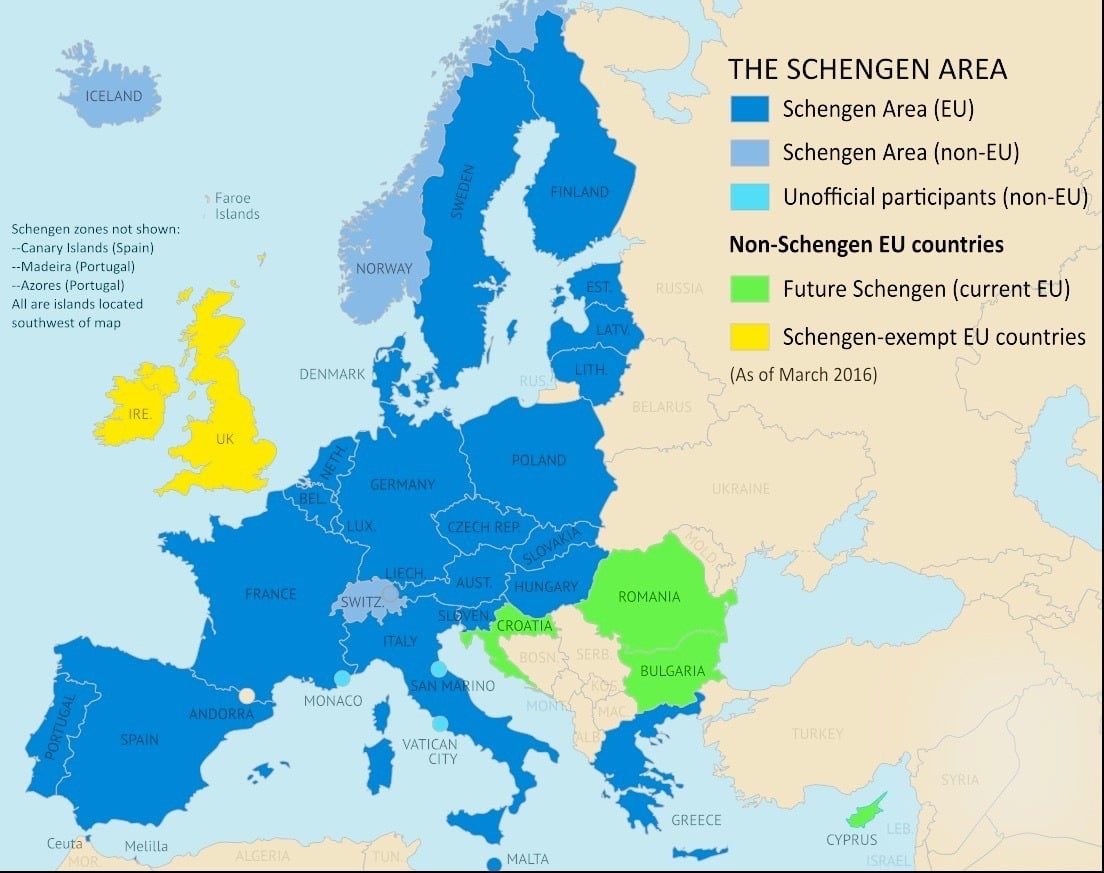
French Land Borders
Like all member countries within the Schengen Zone, France has open borders. This means that there is no official that will stamp your passport when you enter into a neighboring country. That said, there is always the chance that the border police will stop you and check your passport. This is typical to make sure that you have not overstayed your visa.
For the sake of ease, I have not included any of France’s overseas departments.
| Country | Crossings |
|---|---|
| Andora | 2+ |
| Belgium | 2+ |
| Germany | 2+ |
| Italy | 2+ |
| Luxembourg | 2+ |
| Monaco | 2+ |
| Spain | 2+ |
| Switzerland | 2+ |
![]() Visiting France? Don’t risk having to sit on the floor or change your itinerary because you missed the last ticket at the station! Find the best transport, best time and the best fare with 12Go. And why not use what you’ve saved to treat yourself to something nice upon arrival?
Visiting France? Don’t risk having to sit on the floor or change your itinerary because you missed the last ticket at the station! Find the best transport, best time and the best fare with 12Go. And why not use what you’ve saved to treat yourself to something nice upon arrival?
It only takes 2 minutes! Book your transport on 12Go now and guarantee your seat easily.
How to Travel Around France
Like most European countries, France has a great network of fast, reliable transportation. Most cities are connected by buses and trains. If you are keen to take a long-distance train in France, you should book as far ahead as possible. The difference in price can be staggering if you wait until the last minute.
Traveling by Public Transport in France
I recommend taking Flexibus for cheap long-distance bus journeys.
Most major cities have well-connected tram, bus, and metro systems for getting around urban centers.
BlaBla Car is a great website for connecting drivers with people interested in carpooling. If you are wanting to catch a ride to the next city or to a neighboring country, keep an eye out and you might be able to connect with someone on the site. This is not a free ride. Expect to help pay for some of the gasoline and expect to get there faster than the bus.
Renting a car is a great way to see France at your own pace. You can sort your car rental here in just a few minutes. Booking in advance is the best way to ensure you score the lowest price and your choice of vehicle. Often, you can find the best car rental prices when you pick up the rental from the airport.
Make sure you also purchase a RentalCover.com policy to cover your rental vehicle against any common damages such as tires, windscreens, theft, and more at a fraction of the price you would pay at the rental desk.
Campervan Hire in France
Traveling France by campervan is the best way to get around the country without a doubt. You can easily hire a campervan and make a custom epic road trip. If you have a few weeks to spare and really want to explore France, renting a campervan is simply the best option you have!
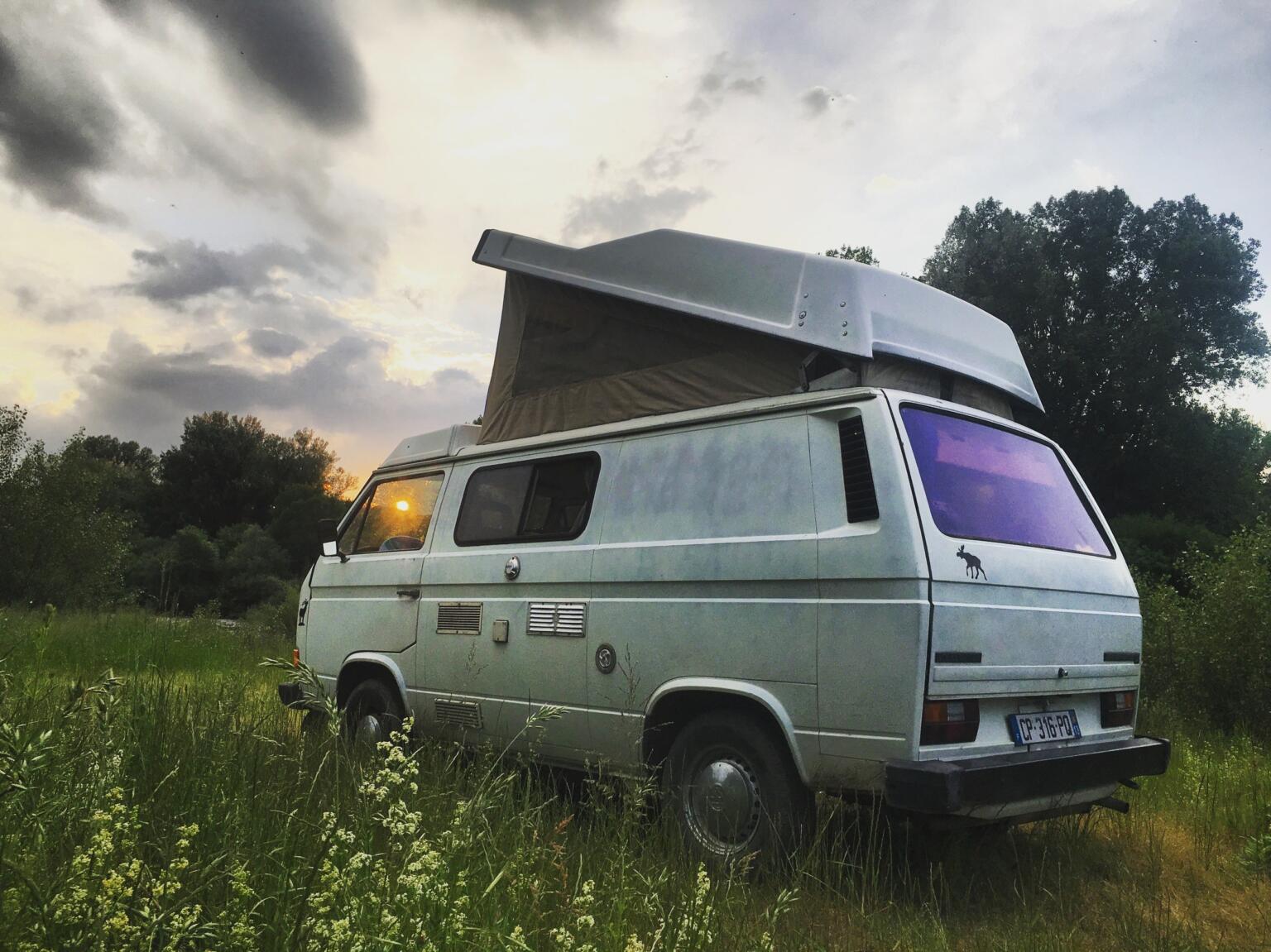
Hitchhiking in France
Hitchhiking whilst backpacking France is definitely an option for those who want to save a few bucks on bus costs. In general, hitchhiking is safe and offers up the opportunity to meet new folks. I would personally never try hitchhiking within big cities like Marseille, Paris, Lyon.. etc.
It is best to stick to hitchhiking in rural areas. Hitchhiking is made a lot easier too if you are able to write your sign in French!
My partner (who is French) has hitchhiked in a few places around France as a solo female traveler with mostly no issues. She has experienced various forms of catcalling from guys passing by, but nothing explicitly scary or dangerous.
Her advice for broke backpackers: “When a car stops, give the person, the car, the contents of the car, everything, a quick look over. If anything about the person or the car feels weird, don’t take the ride. In general people are super friendly, but you still have to be alert and observant. Don’t hitchhike in the north close to the Belgium border or close to any major cities. Plan your route! France has so many tiny roads! Be strategic about which roads will be the best for your desired destination!”
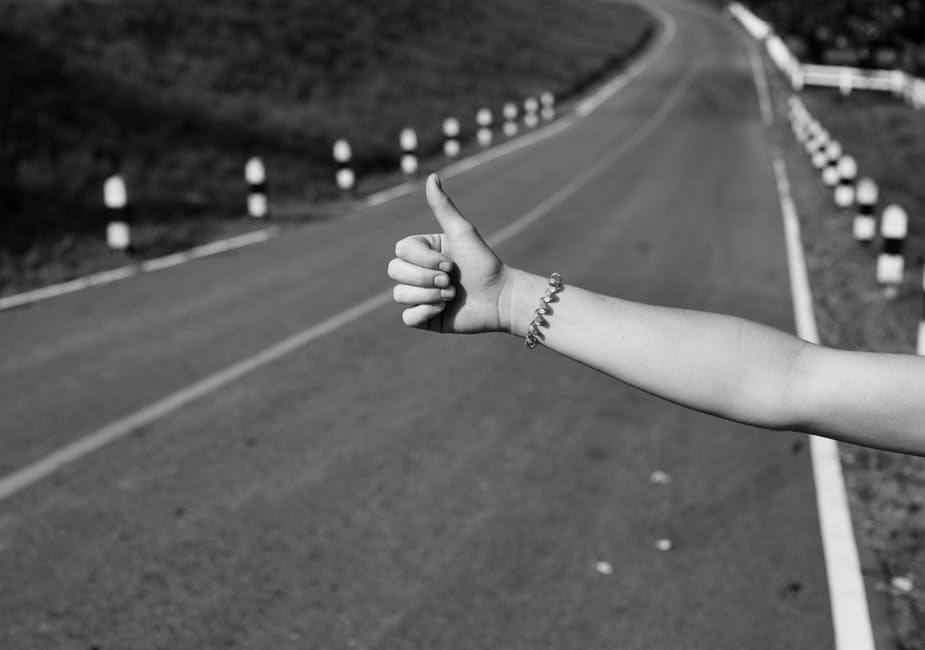
Onwards Travel From France
Getting out of France is just as easy as arriving into it. Cheap long distances buses connect Paris, Marseille, and Lyon with other major European capitals. In most cases, neighboring countries are only a few hours away.
Taking the train or a plane should be secondary options unless you have booked either far in advance.
Taking the ferry across the English Channel is a very popular means of reaching the UK. These ferries are very comfortable and quick (the Channel is only 30 miles wide between Dover, UK and Calais, France). In no time, you’ll be enjoying a pint of bitter and the pasty complextions of the English people!
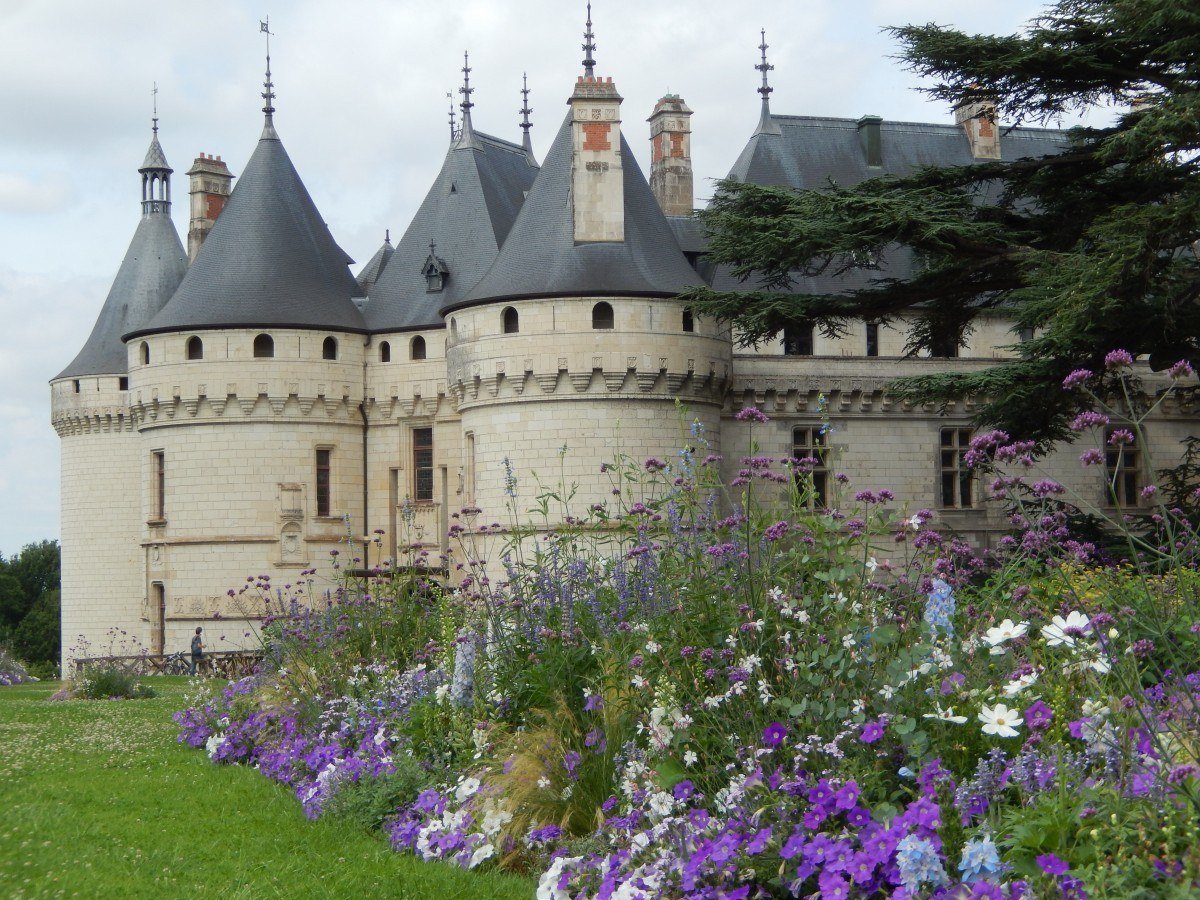
Working in France
Living and working in France is a great opportunity to get some full cultural immersion whilst maintaining a decent living standard. The minimum wage is around $1700 per month but taxes are higher than in the US or UK for example.
If you wish to work in France you will need to speak the language well. The only exceptions are perhaps agricultural work and jobs in hostels and backpacker bars.
A French working holiday or gap year in France is the perfect in between for those backpacking who need a little extra cash.

A new country, a new contract, a new piece of plastic – booooring. Instead, buy an eSIM!
Jetpac eSIMs work just like an app: you download it, pick your plan, and BOOM! You’re connected the minute you land. It’s that easy.
Read about how e-Sims work or click below to see one of the top eSIM providers on the market and ditch the plastic.
Grab an eSIM!Work Visa’s in France
Citizens of the EU and EEA can live and work freely in France. Everybody else will however need to obtain a work visa of some sort. There are a number of different work permit visas available depending in your exact circumstances. Alternatively, you may find temporary seasonal work (such as the grape harvest in September) outside of the system (“travail de nuit” delivered with a nudge and a wink).
Volunteering in France
Volunteering overseas is a great way to experience a culture whilst doing some good in the world. Volunteering continues to be very popular all over the world. There are lots of different volunteer projects in France which you can join whether it be teaching, animal care, agriculture or pretty much anything!
Of course, France is an established nation and doesn’t necessarily need armies of backpacker volunteers like other countries do but the opportunities are out there. If nothing else there will always be “bread and board” type gigs in agriculture.
Want to find some more volunteering opportunities in France? Signup for Worldpackers, a platform that connects local hosts with travelers. As a Broke Backpacker reader, you’ll also get a special discount of $10. Just use the discount code BROKEBACKPACKER and your membership is discounted from $49 a year to only $39
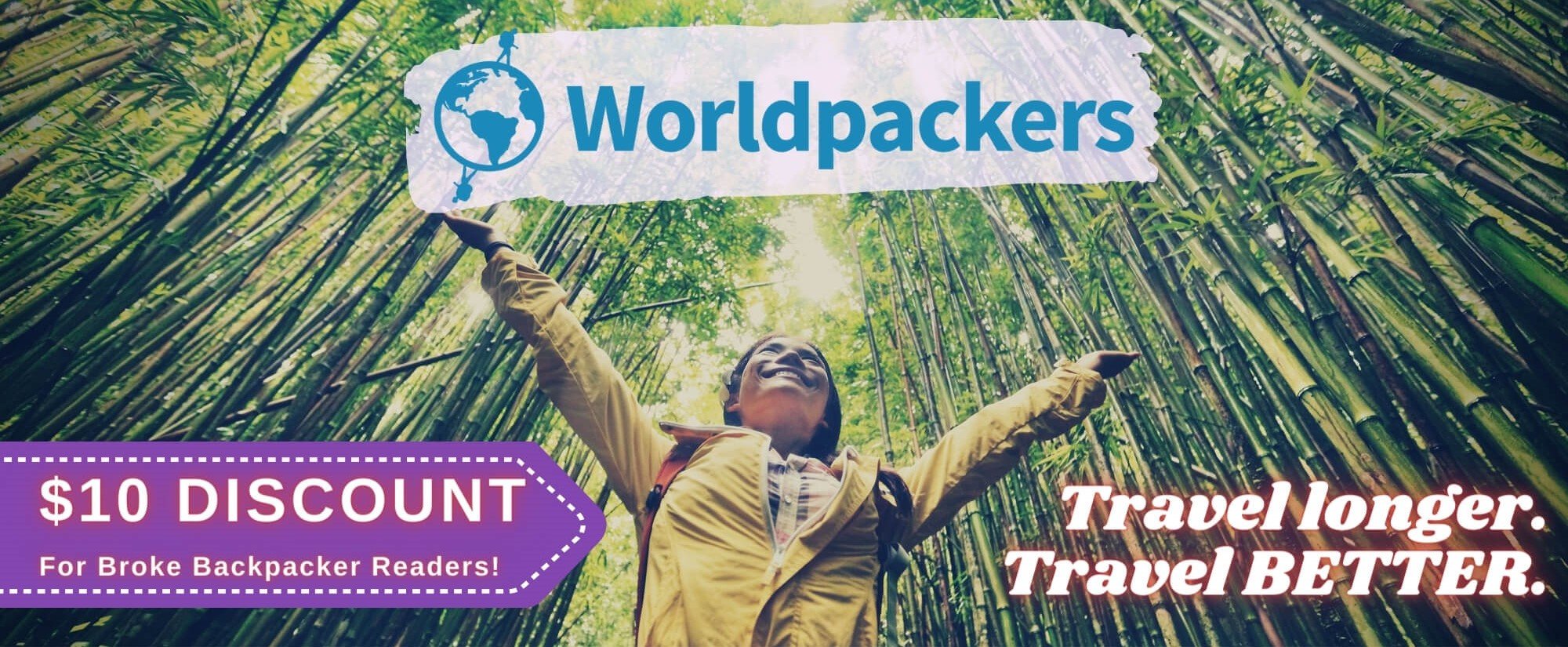
Worldpackers: connecting travellers with meaningful travel experiences.
What To Eat in France
There might be no place on the planet that is more serious about its food than France is. Food is everything in France. For anyone backpacking France, you have the opportunity to taste some of the most delicious food on earth.
France is a country where the art and craft of making artisanal products are a big part of the national identity. From cheese, cured meats, sausage, pâté, bread, olives, quality produce, and an infinity of deserts and sweets: backpacking France will not neglect your belly, my friends!
French Cuisine
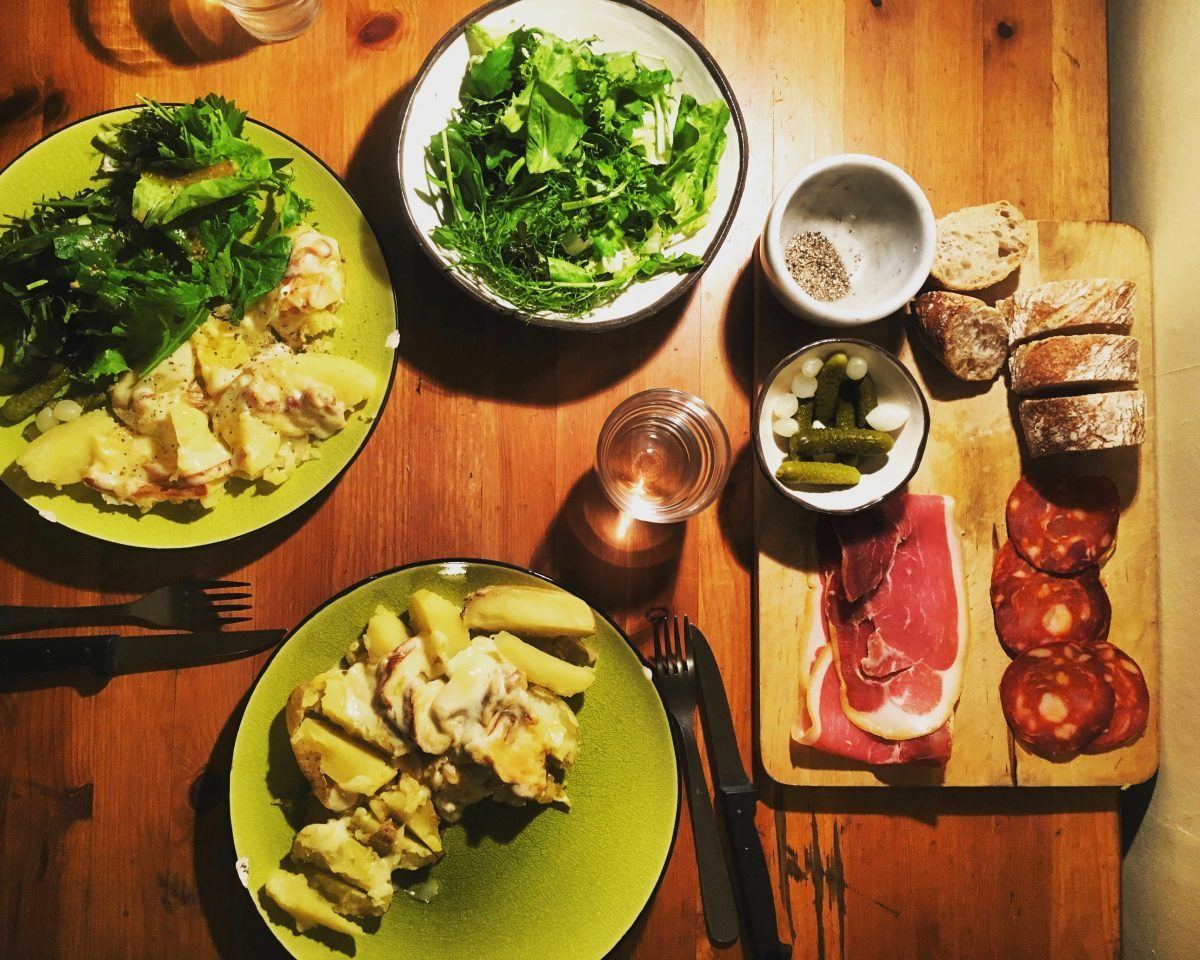
Tartiflette— A dish from Savoy in the Alps. It is made potatoes, Reblochon cheese, lardons, and onions.
Raclette — Another cheesy potato dish originally from Switzerland. Nothing will be more satisfying after a day(s) of hiking in the Alps.
Bouillabaisse —is a traditional Provençal fish stew originating from the port city of Marseille. There is no dish that is more Marseilles then this. The dish can be quite expensive, so if you want to try it, I recommend going in on a bowl with at least one other person.
Charcuterie — A broad term for a wide variety of items. meat products such as bacon, ham, sausage, terrines, galantines, ballotines, pâtés, and confit. Charcuterie is primarily from pork. Every region has its own specialties. The list is endless. Try as many as you can!
Coq Au Vin — A simple, yet delicious stew made from chicken, wine, mushrooms, and garlic.
Fougasse — If you are in Provence, Fougasse is a delicious snack that most bakeries offer for a couple Euros. It is kind of like a type of pizza bread. Fougasse is usually stuffed with olives, cheese, and anchovies.
Crêpes — You might have tried crêpes before, but never this good. You can find crêpes all over France, but the best ones (arguably) come from Brittany. Crêpes can be sweet or salty. Anyway you take them, they are going to be amazing.
Honestly, I could write a whole guide about French food. There is simply too much to include here. Keep your eyes (and nose!) open whilst you are backpacking France, and you will be sure to find new things to try! If you are going to spend money on anything, spend it on good food.
Drinking in France
France is famous the world over for its wine. There is over 20 wine growing regions in France. The bottom line is that wine is serious business in France! I recommend picking out a few wine growing regions that interest you, hiring a bike, and setting off on a tasting adventure. Wear a helmet, especially if you plan to drink beaucoup wine!
Champagne— Perhaps no other drink in the world is synonymous with celebration like Champagne. This bubbly golden beverage is famous for a reason: it’s fucking delicious.
Cabernet Sauvignon— In the world of wine sales, they say “Cab is king”. Cab Sav is certainly a very tasty red-wine, that goes well with meat or pasta.
Rosé— The jewel of Provence. A cool glass of rosé on a hot summer day is hard to beat.
Cognac— Cognac is a variety of brandy named after the town of Cognac, France. It is produced in the surrounding wine-growing region in the departments of Charente and Charente-Maritime. Thanks to American rap music, millions of people have now heard of this legendary beverage. I believe it is worth the hype. Don’t go pouring it all over your girlfriend in some sort of fantasy rap music video reenactment. Please don’t do it, it is expensive shit, and you ain’t a rap star bro.
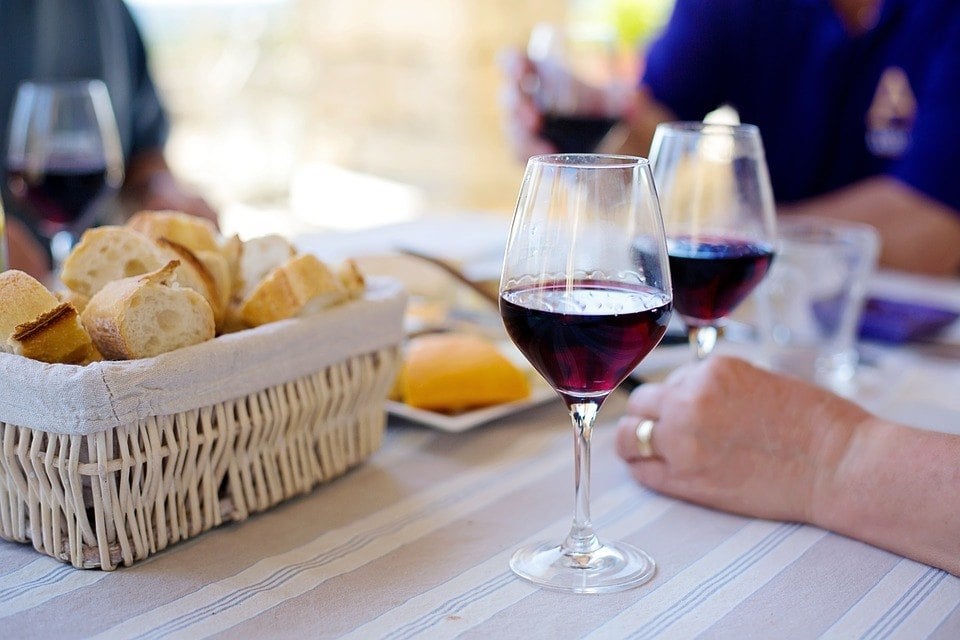
For French cooking classes, check out this site for awesome deals.
French Culture
The French people have the reputation of being a hard bunch of nuts to crack. The truth is, French people are some of the kindest, fun-loving, generous people around. Spending some time with locals is key to experiencing the famous French hospitality. Don’t take your first encounter with a rude waiter at a popular tourist restaurant in Paris personally. I am sure he or she deals with heaps of obnoxious people on a daily basis!
If ever you are invited to diner in a French person’s home, bring some wine along to share!
Useful Travel Phrases For France
French is a beautiful language. Though beautiful, it is not an easy language to learn. There are some great options to learn French in France, but if you just want to know a few basic phrases in French, we’ve got you covered.
A majority of the French population does not speak English. I found that this is becoming less true with young folks, but certainly don’t expect people to speak English to you once you leave the bubble of Paris.
Hello – Bonjour
How are you— Comment ça va?
Beautiful —C’est beau
Please — S’il vous plaît
What is your name? — Comment t’appelles-tu?
I am from…— Je viens de…
Where? — O ù?
No straw please – Pas de paille s’il vous plait
No plastic cutlery please – Pas de couverts en plastique s’il vous plaît
Good Evening — Bonsoir
Thanks! — Merci!
I would like… — Je voudrais…
No plastic bag – Pas de sac en plastique
Books to Read About France
A Moveable Feast — Fancy having a look into what life was like for expats living in Paris in the 1920s? If you yearn for the Golden age of the Lost Generation like I do, this Ernest Hemingway classic is a must read.
Illuminations — Arthur Rimbaud is one of my favorite French poets. Why? Both because he was a genius of his time and a badass traveler in a time when travel wasn’t easy. The prose poems of the great French Symbolist, Arthur Rimbaud (1854-1891), have acquired enormous prestige among readers everywhere and have been a revolutionary influence on poetry in the twentieth century.
The Whole Fromage — The French, sans doute, love their fromages. And there’s much to love: hundreds of gloriously pungent varieties—crumbly, creamy, buttery, even shot through with bottle-green mold. So many varieties, in fact, that the aspiring gourmand may wonder: How does one make sense of it all? If you are passionate about cheese, this book is for you.
The Social Contract — Like democratic ideals? So did Jean-Jacques Rousseau. The Social Contract by Rousseau (1712-1778), argues for the preservation of individual freedom in political society. An individual can only be free under the law, he says, by voluntarily embracing that law as his own. Hence, being free in society requires each of us to subjugate our desires to the interests of all, the general will.
Dating in France
France has become a great melting pot with people from all over the world. The country has some truly beautiful souls both inside and out. The dating game in France is pretty much the same as it is in any western country.
Certainly, getting to know a person from the opposite (or same) sex in a romantic way should be a mutually rewarding experience. Always practice safe sex and treat your partner(s) with the respect they deserve.
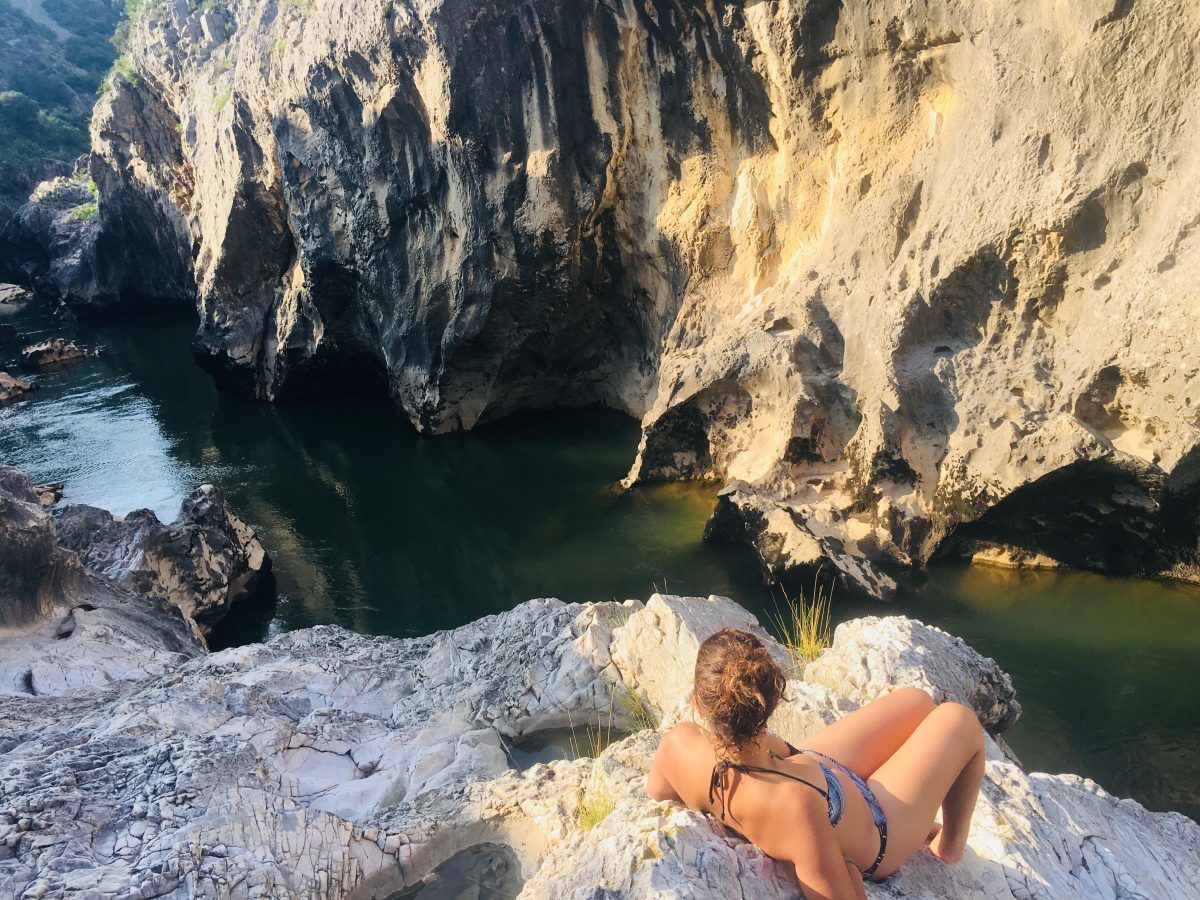
I found that French people really like to have a good time. If you are interested in a sexual or romantic relationship, it shouldn’t be too difficult if you just put yourself out there. I have heard positive reports for the use of social apps like tinder, especially in places like Paris and Marseille.
If you are lucky, you will experience what a real French kiss is all about.
Learning a bit of French has the potential to take you far in the world of dating… Remember that!
Some Unique Experiences in France
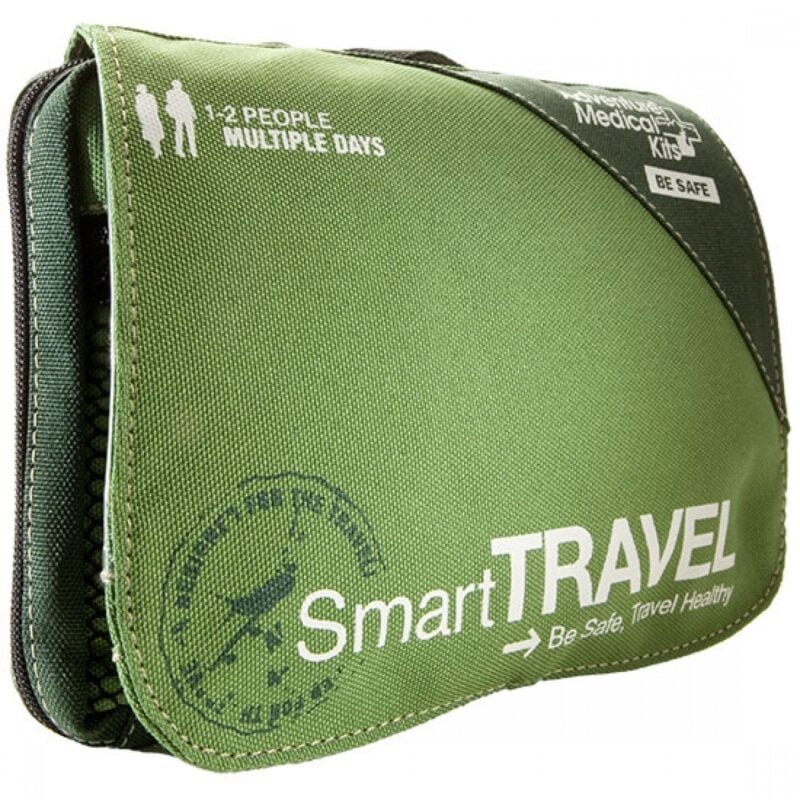
Things go wrong on the road ALL THE TIME. Be prepared for what life throws at you.
Buy an AMK Travel Medical Kit before you head out on your next adventure – don’t be daft!
Buy on REITrekking in France
France is a dream country for trekking nut-cases like me. Almost every region has its own unique trekking draw. The Alps and the Pyrenees have more hiking trails than any one person could complete in multiple lifetimes. In France and throughout Europe there is a network of long-distance treks called the GR hikes.
Some GR hikes take months to complete. The beauty is you can jump on the trail for a day or two, stay in a mountain refuge or pitch your tent and then come off again. Alternatively, you can keep hiking for months on end, stopping in the small villages along the way to resupply and shower.
The late spring and early summer are the best time to be hiking in the mountains. However, in many parts of France, there are awesome hikes to be had all year, especially in the south.
Best Hikes in France
1. Tour Du Mont Blanc — Famous circuit Around the Mont Blanc massif. Outstanding views of Mt. Blanc, Western Europe’s highest at 4,810m, and out across the dramatic peaks, glaciers, and deep green valleys of the high Alps. This hike, which I did with my dad, was hands down one of the best long-distance hikes I have ever done. Go for it!
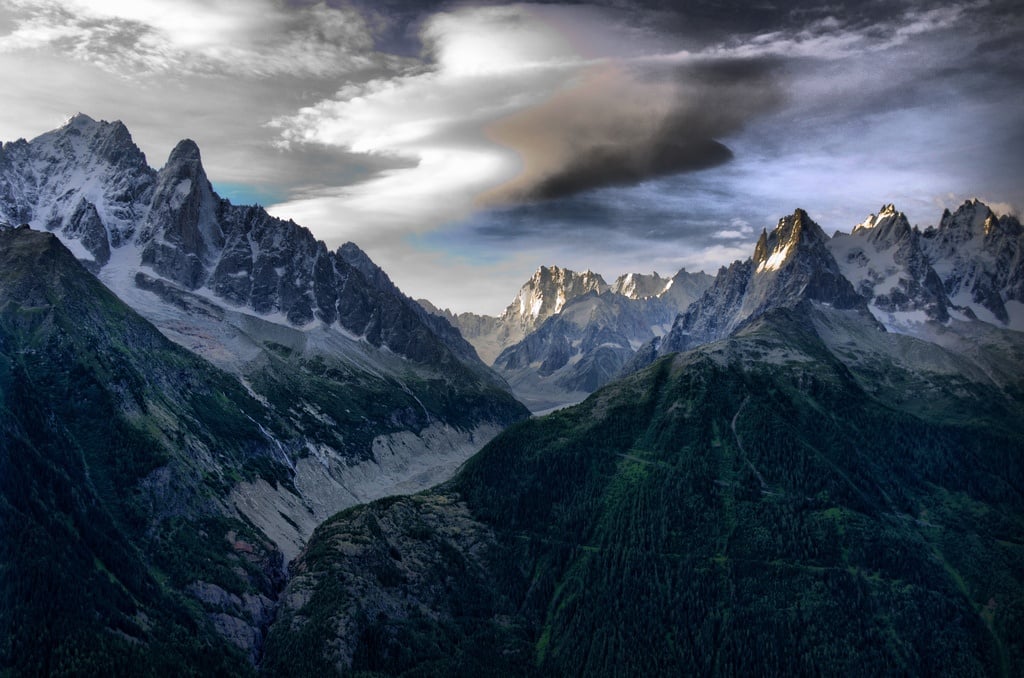
2. GR 20 Corsica — The GR20 hiking trail in Corsica – one of the best adventure destinations out there -is famous for being one of the toughest long-distance hikes in Europe. With its dramatic gorges and rocky hillsides, this legendary trail is for the dedicated and prepared hiker only.
3. GR 4: Verdon Gorge — Encounter the enormous, calcareous cliffs of the Verdon Gorge, claimed by some to be the deepest gorge in Europe. Abundant wildflowers, plant life and wildlife across a huge, unspoiled and undiscovered area of exquisite natural beauty.
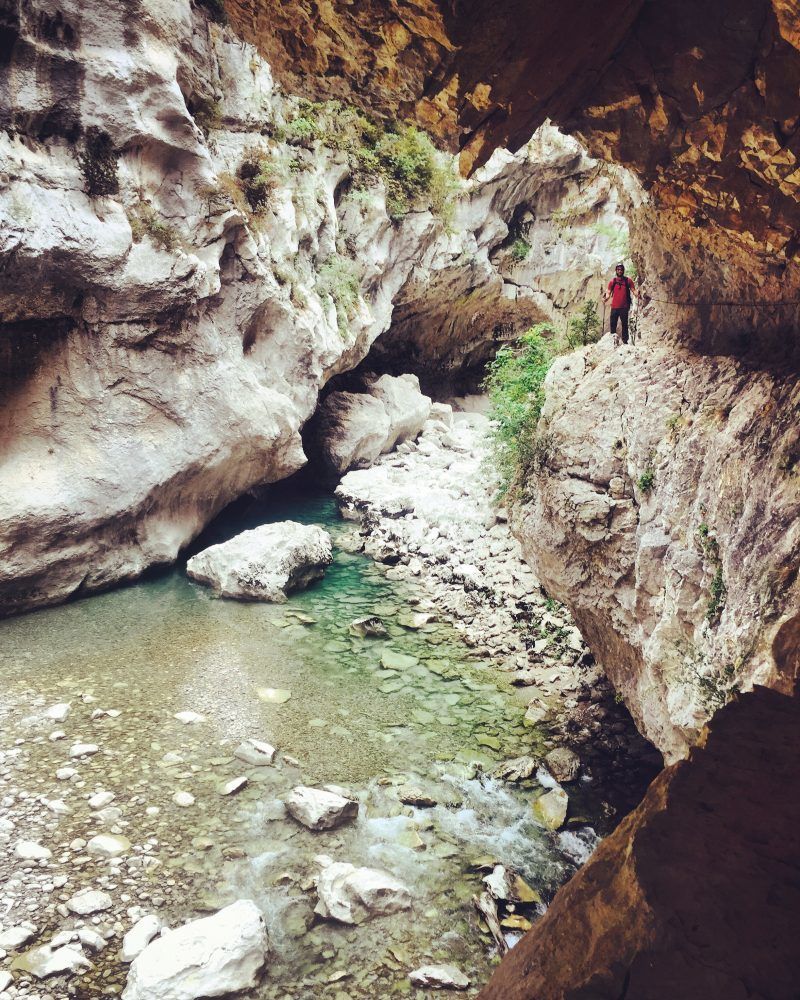
4. GR5 or Grand Traverse des Alpes — The trek takes about a month to complete and takes you clear across the whole Alps range finishing on the coast near Nice.
5. Walkers Haute Route (Chamonix to Zermatt) — A famous high route from Chamonix to Zermatt. The trek features absolutely classic alpine scenery, snowy peaks, glaciers, high meadows and deep valleys, and close-up views of such icons as Mont Blanc and the Matterhorn.
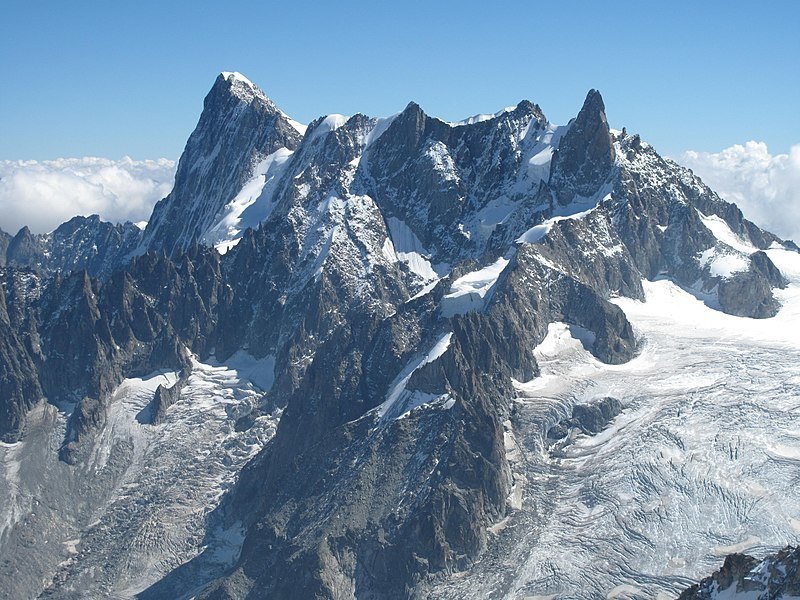
Modern History of France
Perhaps no other event in the history of modern France has had such a broad impact as World War Two. 600,000+ French citizens died. Cities were destroyed. Many areas in France were under the control of Nazi Germany during the war, including Paris.
In November 1942 all of “Vichy” France was finally occupied by German forces. The French state continued in existence but it was closely supervised by the Germans.
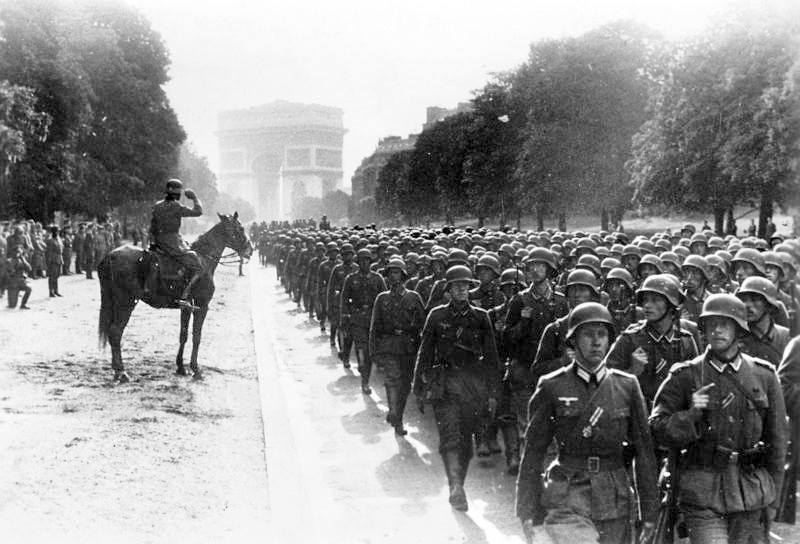
Photo: Folkerts (WikiCommons)
The Vichy regime sought to collaborate with Germany, keeping peace in France to avoid further occupation although at the expense of personal freedom and individual safety. Some 76,000 Jews were deported during the German occupation, often with the help of the Vichy authorities, and murdered in the Nazis’ extermination camps.
Liberation of Paris: In what is considered the last battle of the Allied Operation Overlord, Allied forces, and in particular Free French Forces and the French Resistance, liberated Paris from German occupation as a strong symbolic effort to restore French honor, tarnished by the fast defeat. The rest of France was liberated as the Allies advanced towards Germany.
The War finally came to an end on September 2nd, 1945.
Post War France in Recovery
The political scene in 1944–45 was controlled by the Resistance, but it had numerous factions. Charles de Gaulle and the Free France element had been based outside France, but now came to dominate, in alliance with the Socialists, the Christian Democrats (MRP), and what remained of the Radical party.
The Communists had largely dominated the Resistance inside France, but cooperated closely with the government in 1944–45, on orders from the Kremlin. There was a general consensus that important powers that had been an open collaboration with the Germans should be nationalized, such as Renault automobiles and the major newspapers.
The End of French Colonialism
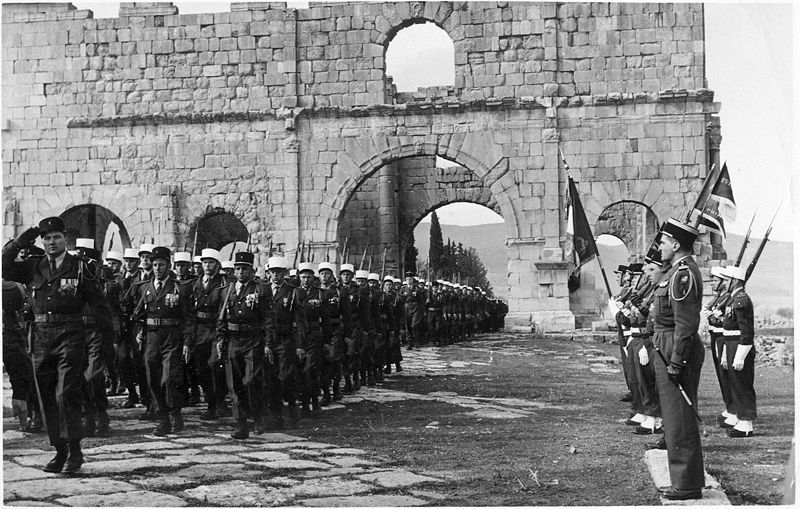
Photo: Richard Bareford (WikiCommons)
The May 1958 seizure of power in Algiers by French army units and French settlers opposed to concessions in the face of Arab nationalist insurrection ripped apart the unstable Fourth Republic. The National Assembly brought De Gaulle back to power during the May 1958 crisis. He founded the Fifth Republic with a strengthened presidency, and he was elected in the latter role.
He managed to keep France together while taking steps to end the war, much to the anger of the Pieds-Noirs (Frenchmen settled in Algeria) and the military; both had supported his return to power to maintain colonial rule. He granted independence to Algeria in 1962 and progressively to other French colonies.
Late 20th Century French Politics
Fast forward a few decades. After the fall of the USSR and the end of the Cold War potential menaces to mainland France appeared considerably reduced. France began reducing its nuclear capacities and conscription was abolished in 2001. In 1990 France, led by François Mitterrand, joined the short successful Gulf War against Iraq; the French participation to this war was called the Opération Daguet
The French have stood among the strongest supporters of NATO and EU policy in the Balkans to prevent genocide in Yugoslavia. French troops joined the 1999 NATO bombing of the Federal Republic of Yugoslavia. France has also been actively involved against international terrorism.
In 2002 Alliance Base, an international Counterterrorist Intelligence Center, was secretly established in Paris. The same year France contributed to the toppling of the Taliban regime in Afghanistan, but it strongly rejected the 2003 invasion of Iraq, even threatening to veto the US proposed resolution.
Modern Race Tensions in France
At the close of the Algerian war, hundreds of thousands of Muslims, including some who had supported France, settled permanently to France, especially to the larger cities where they lived in subsidized public housing, and suffered very high unemployment rates.
In October 2005, the predominantly Arab-immigrant suburbs of Paris, Lyons, Lille, and other French cities erupted in riots by socially alienated teenagers, many of them second- or third-generation immigrants. The riots lasted 3 weeks. Cars were burned, shops looted, and thousands of people were arrested.
Charlie Hebdo Murders
In January 2015, the satirical newspaper Charlie Hebdo that had ridiculed the Islamic prophet, Muhammad, and a neighborhood Jewish grocery store came under attack from radicalized Muslims who had been born and raised in the Paris region. World leaders rallied in Paris to show their support for free speech. The episode had a profound impact on France.
As of May 2017, Emmanuel Macron began his term as president of France.
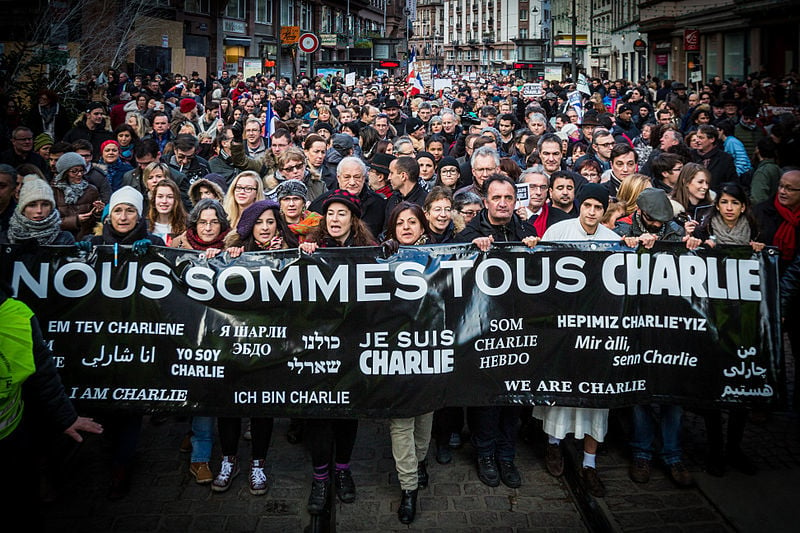
Photo: Photo Claude TRUONG-NGOC (WikiCommons)
France in 2018
France is a very diverse country populated with people from the far corners of the globe. This diversity helps to give France the strong character it has today. French people are very proud to be French and they are not afraid to fight for justice, equality, or democracy.
In France, there is a strong history of citizens coming together to affect change and even revolution when they deem the time to be right. France in 2018 is a very interesting place to be. Enjoy the hell out your time backpacking France!
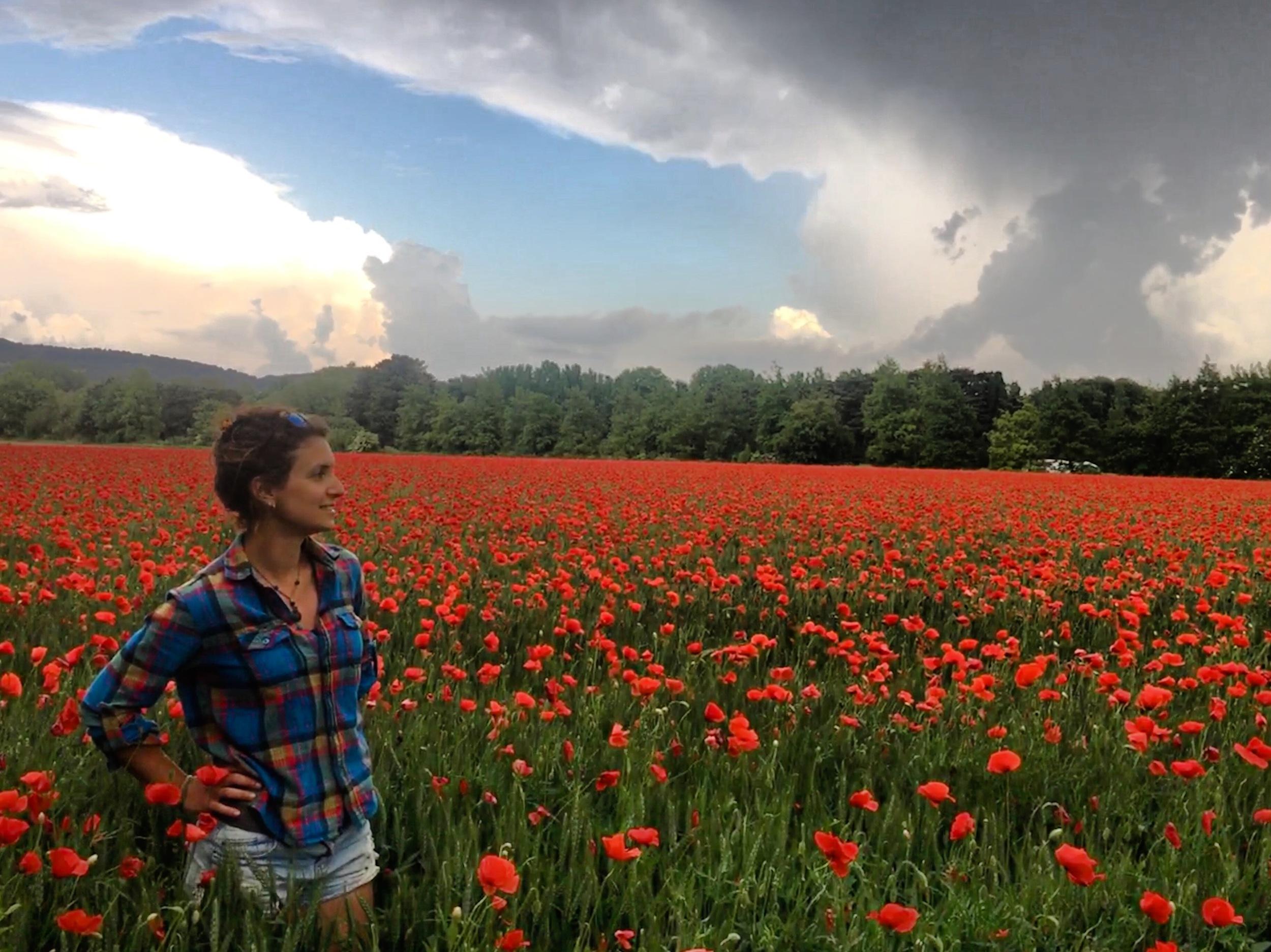
Joining an Organized Tour in France
For most countries, France included, solo travel is the name of the game. That said, if you are short on time, energy, or just want to be part of an awesome group of travelers you can opt to join an organized tour. Joining a tour is a great way to see a majority of the country quickly and without the effort that goes into planning a backpacking trip. However—not all tour operators are created equal—that is for sure.
G Adventures is a solid down-to-earth tour company catering to backpackers just like you, and their prices and itineraries reflect the interests of the backpacker crowd. You can score some pretty sweet deals on epic trips in France for a fraction of the price of what other tour operators charge.
Check out some of their awesome itineraries for France here…
Final Advice Before Visiting France
Well that’s all for for guide. We put a lot into it and hope you get a lot out. The last thing we will say is simply to remember to have a great time – you will fall in love with this country and will want to return!
Buy Us a Coffee!
A couple of you lovely readers suggested we set up a tip jar for direct support as an alternative to booking through our links, since we’ve decided to keep the site ad-free. So here it is!
You can now buy The Broke Backpacker a coffee. If you like and use our content to plan your trips, it’s a much appreciated way to show appreciation 🙂


